#wanted to do contemporary pictures for a change and thought these were powerful
Explore tagged Tumblr posts
Text
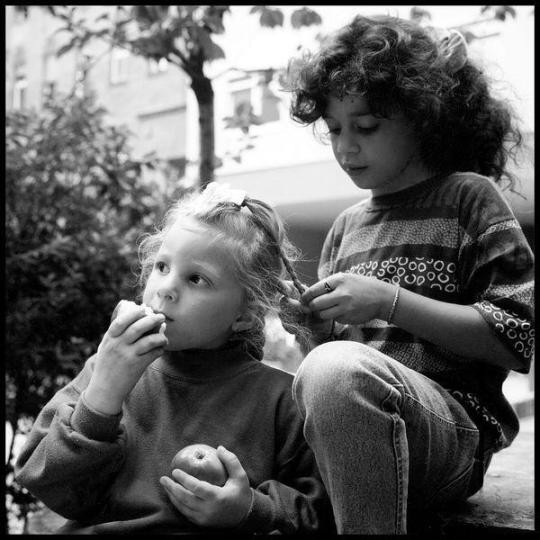
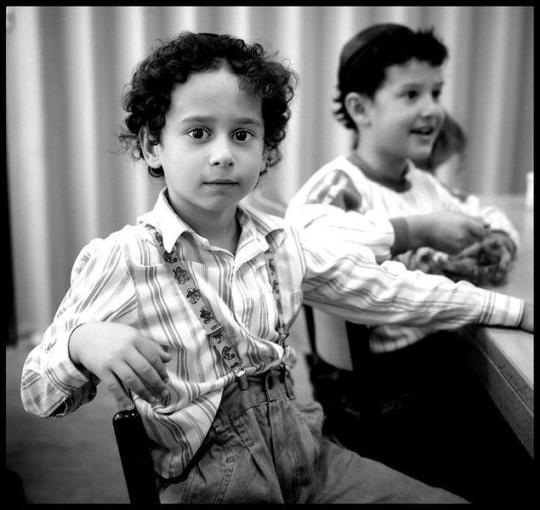
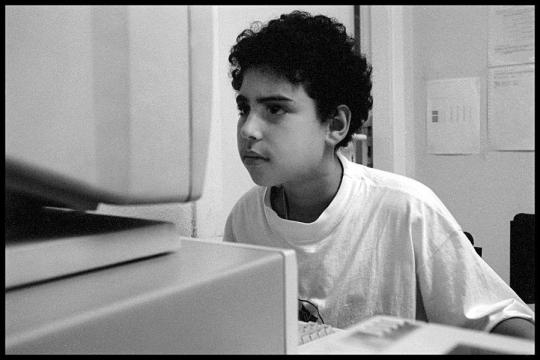
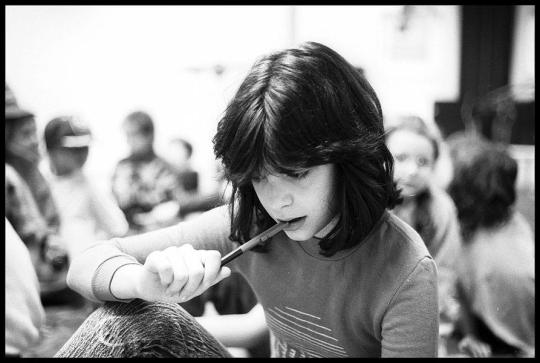
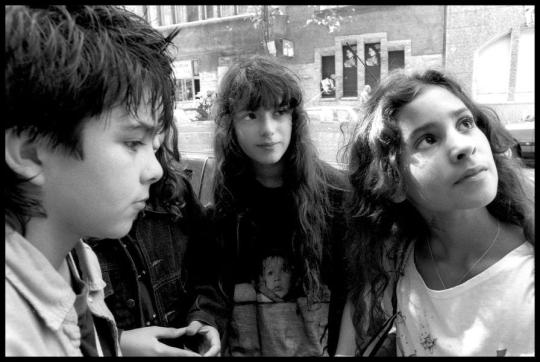
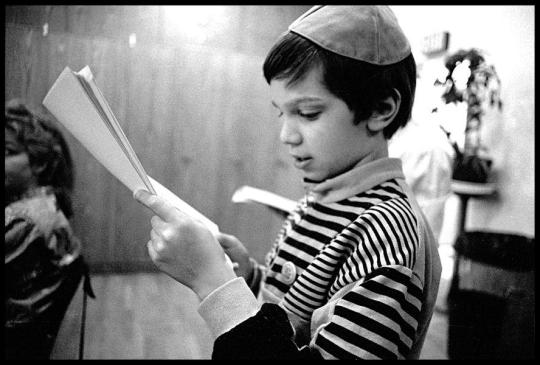
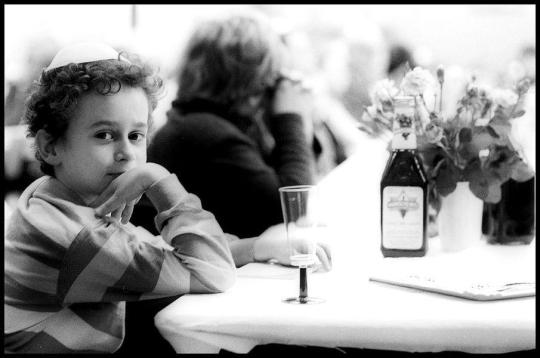
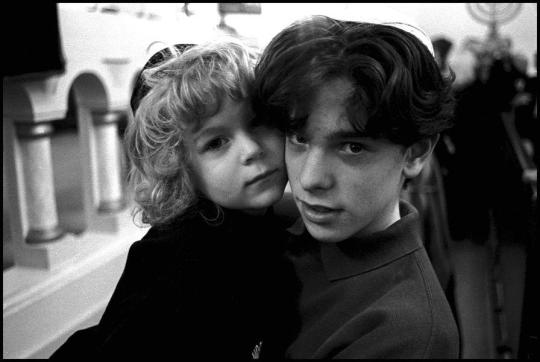
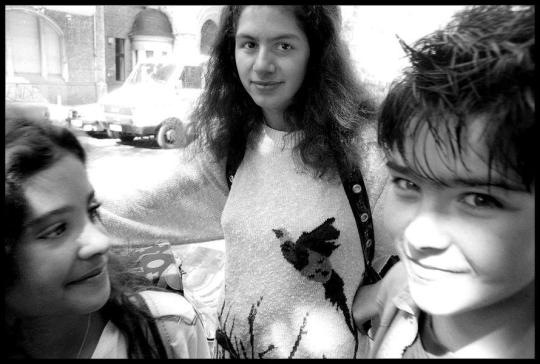
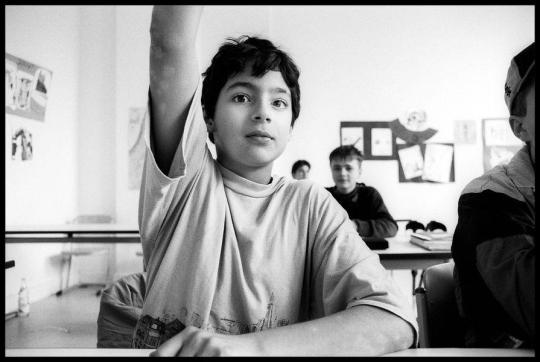

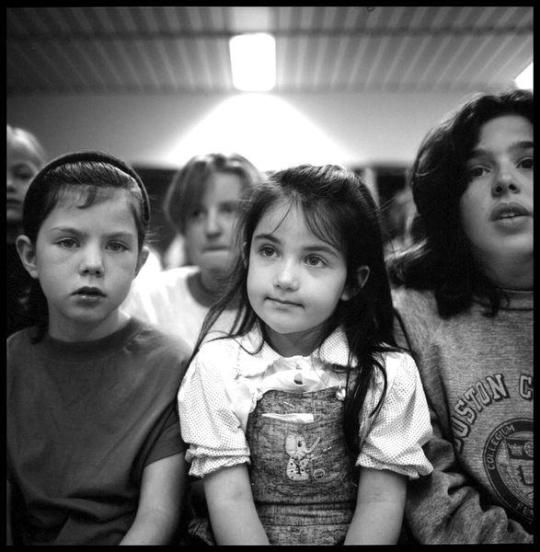
Images of Jewish youth in Germany, 2016, photographed by Edward Serotta
#jumblr#jewish#jewish photography#jewish history#my posts#wanted to do contemporary pictures for a change and thought these were powerful#they all have my heart but top left girls and laughing little guy on the bottom left especially
162 notes
·
View notes
Text
Photographer - The Emperor
Going insane over the new idv tarot design like a very normal person, specifically looking at Joseph.
I'll be looking at meanings from a range of websites though most tend to follow the same message.
General Meaning
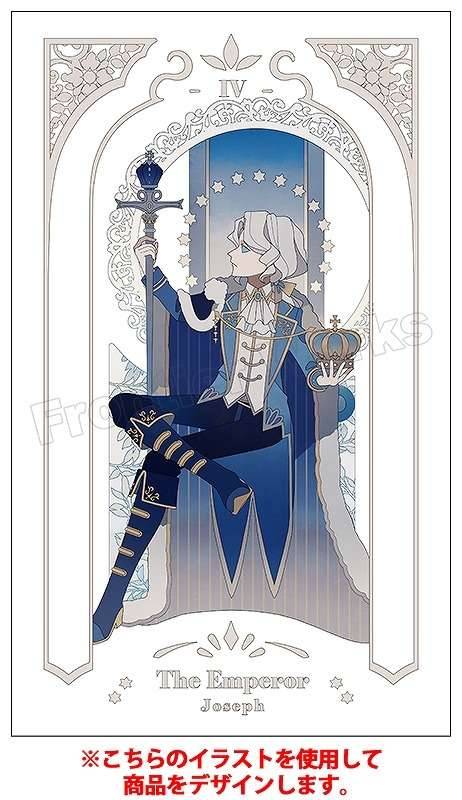
This is the card that asserts authority, organizes systems to retain maximum control and is the paternal influence of the Tarot deck, assuring that protection and security are provided to all those playing by the rules.
From this meaning alone it feels like the Emperor is the perfect card for Joseph. Immediately my first thoughts go to his inventions and obsession with the mirror world. The CN translation of his third character day letter sees him call the photo world akin to an "eternal kingdom", which has more hopeful connotation.
Joseph doesn't necessarily have malicious intent. Yes, the things he's done are utterly heinous and would be to any rational person who heard of them, but the bottom line is that both Joseph's hubris and his genuine belief that what he is creating and working towards will help people. Joseph sees living as suffering, but he doesn't see the afterlife as something that can guarantee him happiness either. Because the afterlife is foreign and unknown to the happiness he experienced as a child.
Instead he chooses the camera world. Preservation, something he has created, where everyone can be happy together, trapped together in a beautiful eternity. The photo world is the peaceful world where they will all rest, away from the adversities of life.
So how does this all relate to the Emperor? I like to think that it makes sense that because of how many things in Joseph's life that were out of his control ruined him, in the broader sense he does need (or feels like he needs) a huge sense of control, as much control as possible. The camera world allows him that. He's the master of that world but he does not assert such authority to rub his own ego necessarily, but because he's convinced that people need protecting. That living is suffering, and he's merely doing what's best for all. He is protecting them.
I also want to note it might be important that we are served the Emperor card upright. The reversed position of the card implies a lack of control leading to an abuse of power and unwise decisions. What Joseph does is undeniably an abuse of power objectively, but describing it as just that loses a lot of the nuance behind his actions and motivations. Despite how clearly mentally unstable Joseph is he is in control of what he is aiming to do. Like what the Emperor card represents, he has a burning ambition to achieve his goal no matter what it takes — and we see that from the way he does not falter after all his friends leave him, how it's implied that not even Elliott could stop him even though his words left some impression on him.
Design Notes
Moving on, I'd like to look at the design in more detail in comparison to what the traditional Emperor card looks like.
To get the full picture of the design we can look at the actual heritage of the Tarot card, which read me down a rabbit hole of exploring the history of the Emperor card exclusively. One detail that stuck out to me particularly was the fact Joseph isn't facing the audience in his card. In more contemporary decks the Emperor faces you head on, but Joseph isn't. I'd say this is likely in relation to the Tarot de Marseille characteristics.
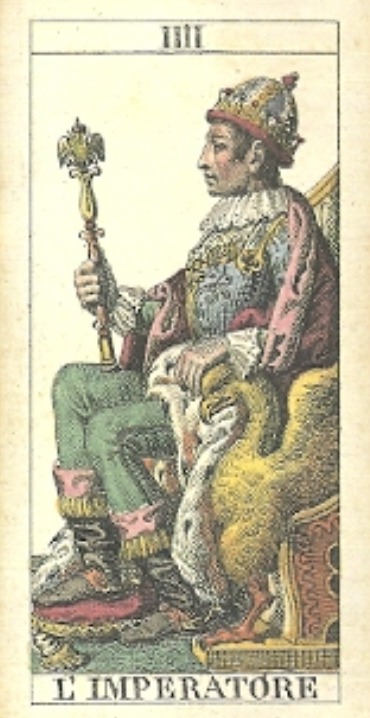
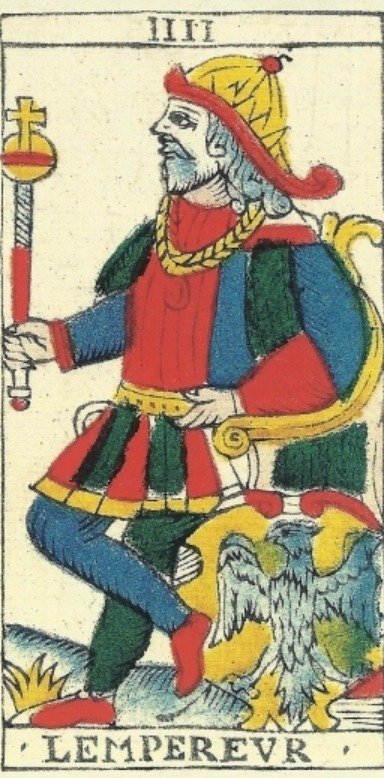
By the mid-seventeeth century after Tarot card production had moved to France, the Emperor gained the characteristic of sitting on his throne in profile with his legs crossed.
The position of his legs was staged for maximum effect. Sitting at ease with one leg crossed over the other traditionally signified the highest status person in the room, or someone about to pass a legal judgment.
This doesn't drastically change the meaning of the card itself, but I thought it was a cool detail nonetheless. It feels quite fitting for Joseph ( Judge skin aside ) in the sense that he believes that what he is deciding for people is right, or that he even has the authority to in the first place. It fits well with his arrogance and ultimately all the other decisions that lead him to his self-destruction in a way.
The detail doesn't stop there. The Emperor card changed yet again with the occult tradition.
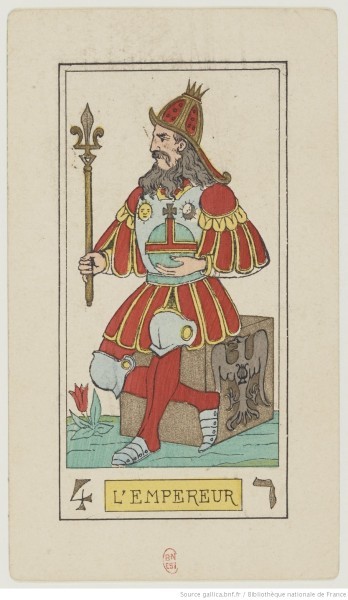
19th century occultists like Eliphas Levi, Oswald Wirth and Papus retained the Tarot De Marseille image but added their own cosmic interpretation. Particularly They saw the Emperor’s body as a triangle with his legs making a cross. Together these form the symbol for alchemical sulfur and allude to spirit dominating matter ( now where does that sound familiar ... )
What's particularly relevant to Joseph is that Wirth changed the Emperor's legs slightly to be more like the astrological symbol of Jupiter.
Because of the Emperor’s association with the number four and the Hebrew letter Daleth (door or womb) occultists saw the Emperor presiding over the birth of all material things, then ruling the material world as Jupiter. The globe topped by a cross, a traditional symbol of the Emperor’s worldly and spiritual power, was reinterpreted as the astrological sign for Venus, emphasizing the concepts of birth and creation. The Emperor represents the creative fire at the heart of all beings; so he’s also energy trapped in the material world.
So how does this all relate to Joseph? Well as I said this doesn't drastically change the meaning of the card, but there are small details and nuances that you could interpret liken to Joseph. Like how the pose he's sat in originates from when tarot deck production grew in France. On the other hand, the connotations of Jupiter could be the way he did achieve his goal in a way in creating the mirror world — defying the rules of life and death itself. Since the Emperor also represents the creative fire at the heart of all beings it could also be alluded to Joseph's origins as a creative in his journey, and his wish to see something more than the dullness and dread of life.
There is a lot more to the card heritage of the Emperor and other parts I could have mentioned, but I decided to include these as the most relevant. I'll have it referenced in the end if you'd like to check it out!
Now I'll continue my insanity into what the Emperor card means in certain contexts.
Past
In the past position, The Emperor represents a father or other authority figure who laid down the law and set a firm definition of acceptable behavior for you. Perhaps you rebelled against him or his teachings, or maybe they helped to keep you out of harm’s way. If you are in a secure position now, you have The Emperor in this position to thank. But some people do abuse their authority and if you are alone and alienated after being witness to the abuse of authority, this card confirms that the blame is there. Often we are given rule over our world and mess things up ourselves. Other times, the trust that put us in the care of another is at fault when this person goes overboard and so The Emperor represents a tyrant.
Honestly I don't have one set idea of interpretation in regards to Joseph and his story in terms of the past.
The first thing that came to mind was his father. We don't know a lot of things about Joseph's family outside of Claude especially with his relationship with his parents. All I can think of is Joseph's 2021 character day art where there were noticeable cracks over his father and mother in the portraits behind him.
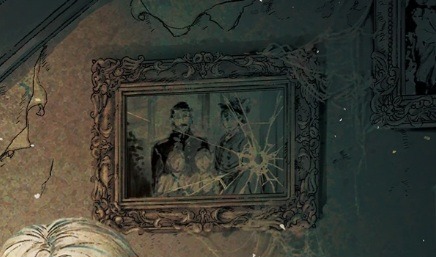
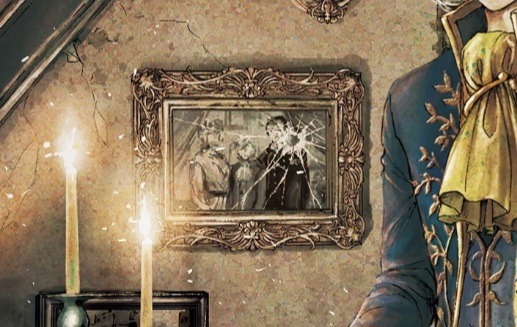
Considering Joseph is hardly in a secure position, it might be implied that something went wrong too with his parents. When he lost Claude he had no other immediate family that we know of aside from them, but until he was of age he still would have been under their care. Was there a certain pressure placed on him as the only remaining son of the Desaulnier family? Did Joseph feel perhaps alienated by his parents who may have tried to move forward much quicker than himself? These are questions that we can't answer yet.
The other "tyrant" of Joseph's past I had in mind could have been the person who lent him those books on the occult when he visited the unnamed manor. I already alluded to such a person bearing similarities to Henry and Dorian in my little ramble after finishing the picture of Dorian Grey. But again, there's nothing to he said for sure.
Present
When The Emperor is in the present position, you have the rule of law before you to guide you on your journey. This card is especially strong in the present position as it gives you an absolute confidence to move toward a goal. This can also represent the influence of another person in your life right now. Are you so enamored of a new friend or lover that you have started following the advice and lifestyle habits of him or her? Have you discovered a new hero in the arts whose work has expanded your consciousness to the point that it is hard to relate to people who have not had a similar reaction to this person’s artistic output? Is there a new teacher in your life who has changed the way you think? Perhaps a new person at work is transforming the way you approach your on-the-job goals. The theme running through all of these possibilities is that one way of seeing the world is coming to dominate the way you experience life.
I've highlighted that last part for reasons that I've already stated in this post. But that line in particular is pretty relevant to Joseph.
Joseph who could not run move on from his grief and instead fell deeper into it. Joseph who could never enjoy life the same without Claude in it and after seeing the horrors that death brings, in his brother's death and the revolutionary war that tore up everything he had ever loved and known. Joseph whose life was dominated by his grief, anger and anguish that pushed away those who might have loved and cared for him — even Elliott, at the very end, could not save him.
Future
The future position is an uncomfortable position for The Emperor. The days and weeks ahead are vague and quite affected by the smallest decisions of the here and now. The Emperor card demands to assert itself. When The Emperor card is here, anticipate a change to come into your life in a bold manner; expectations to conform in the way you carry yourself may be part of this picture. Regardless of the situation, understand that new demands to follow a specific behavioral prescription will be coming your way and coming in the near future. Prepare now to submit, evade or resist.
There's a number of ways you could interpret this and none are strictly right or wrong. A lot of which echoes much of the sentiments of needing control, disliking uncertainty and particularly change in general ...
It could also be interpreted in regards to the trajectory of Joseph's life after Claude's death — what became of his future. We have seen Joseph has gained a habit of self-restraint now — not truly speaking what's on his mind but rather speaking what he needs to achieve a means to an end. He's someone who does feel the weight of peoples' expectations on him and seeks to excel past them, and that particularly becomes evident post the tragedies of his younger years. He changes particularly in the way he carries himself, whether that be influence of his own grief or that new-risen demand as the Desaulnier's surviving son and the pressure he put on himself.
Final Notes
You made it to the end! You must be as crazy as me or smth damn.
Anyways this was an unnecessarily long ramble of me basically saying how perfect this card is for Joseph and his story and I'm sure there's so many other elements I missed out and failed to convey. But this is all for fun! Don't take my words as law.
I kind of want to do some more for a few of my favs so ..
#idv#identity v#joseph desaulnier#identity v photographer#idv photographer#idv joseph#kainalysis#actual mania#as in typing this was a fever dream#i was juet waiting for the cleaninf lady in our dorms to finish#forgive typos or obnoxiously long sentences im a law student
38 notes
·
View notes
Text
@a-tale-of-legends
I've reread our discussion here: https://www.tumblr.com/a-tale-of-legends/772600744133230592/what-was-the-young-adults-nessa-raihan-sonia
I got thoughts about what you said about the correleation between Leon and ghosts, in canon and in your AU. They and thoughts from a different fandom / a different show's characters combined.
An OP in the fandom mused in a post about how one of the show's protagonists, trapped in a different universe, lost his identity similarily to somebody who died. The people who learned or knew about him projected onto the few things he left behind. How they imagined him to be some (limited) way, what he feels, to have a reason for their actions. And he couldn't refute them because he wasn't able to do so. It ties into the loss of autonomy of several aspects of his person he's experienced through his life.
The same character was barely present in other people's minds. He isolated himself. He didn't reach out, hid parts of himself, and didn't seek the things that fulfilled him. He internalized other people's thoughts about how he had to be a 'hero' to be worth anything.
Which meant his disappearance didn't affect anybody but his twin brother (another protagonist), who was also the only who knew he had disappared. His brother pretended to be him to bring him back, but only in name, not personality. Nobody else noticed or didn't care about the change - or about his brother, either - to notice that he was gone.
And said brother projected his own desires onto him all the time he was gone, too. Even after he returned, which also meant it was the first time he appeared on the screen for the audience, he still was a ghost. The world had moved on without him. People speculated about snippets and objects he had accidentally left behind decades ago, when he was a different person. He wasn't any of the things people imagined him to be.
-
That's a lot like Leon and Eternatus by extension, isn't it? Yes, also the Wolves who evoke ghosts as well, but in a different way. They were loved and remembered for some time - the fifth tapestry, the statues, the kings' graves wielding their symbols and weapons - before their existence was covered up.
Eternatus and Leon are interpreted in the present to be used.
It was only implied, so that or the parallels between them don't really have any weight in the game. But the theme of absence and death = loss of identity + loss of autonomy and vice versa, and
loss of (identity / autonomy) = loss of (autonomy / identity) just fit.
Almost nobody alives remembers that Eternatus even existed. Almost nobody knows what the storm of the Darkest Night was, but I get the feeling most in-universe assume it was a natural catastrophe rather than a pokemon. Something that needed to be overcome. And it was stopped!
But its remains are everywhere in Galar. Used as a power source in contemporary times, and used to intentionally dynamax pokemon. They are the base for how the current Galar League works! But people call them 'Wishing Stars' and don't realize what they're actually holding against their wrists, physical pieces of history haunting the present.
And nobody outside a select few people in Macro Cosmos knows it exists when it wakes up again, trapped now under Hammerlocke Castle. Maybe a shadow its former self, symbolized by its skeletal form. It probably doesn't know where it is, or what's happening, or what these humans want from it. Not at first, at least. Meanwhile, Oleana and Rose must've been planning for years how to sell using Eternatus as a living battery to the public. It's a cog in their scheme, but Rose genuinely also sees it as Galar's Savior. What it wants or needs is irrelevant.
Leon, on the other hand, is likely Galar's most known person. His picture is flaunted on banners, ad boards, toys, shirts, etc. People want to be him. They want to defeat him. Analyze his strategies, team compostion, mind.
They want a metaphorical piece of him, and take his merch. Consume every bit of media about him because his persona has been marketed, and Macro Cosmos wants it to be consumed.
He's as much an ideal as an obstacle - but barely ever a person. Not even his oldest friend or his little brother know him closely anymore, and he doesn't know them either. Almost everybody projects onto Leon because they don't know him (anymore), and he's not present enough to get to know him. To know his burdens.
People cannot read him. Even Opal, Galar's most experienced gym leader, doesn't know whether he wants to win or lose.
To some, like Bea, he's like a spectre of defeat that haunts them because he always haunts all battlefields. Always there, always present, but also not. You can't predict where he will go or appear, always on the move in his job as the Champion, but also because Rose jerks him along to do tasks for him. He has little time for personal things or relationships, if any at all. He's Galar's Hero.
Rose expects him to go along with his plan, and gets angry when Leon - only receiving details from him, not that he's trapped a pokemon or another Darkest Day is on the horizon - asks for one more day. He didn't expect him to defy him even in the smallest matter.
Rose pins the blame on him the next day for things going wrong to put pressure on him and push the blame away from himself. Then dubs him his personal knight who has come to protect him from the dragon. The second, other most important cog in his scheme.
3 notes
·
View notes
Note
Oh hello! I thought I would just ask you what you thought about Brian Masters' biography of EF Benson? I'm about a third of the way through and my mind is buzzing with it!
Hey! I think it captured his life rather well, and the writing style is pleasant and accessible. It's a good introductory reading not only for those who want to know about Fred, but also about the Benson family, considering his parents and siblings are figures with constant presence, and they were quite an interesting lot. His relationship with Arthur is wonderful, since they were very different men, but clearly fond of each other.
I do wonder about some Masters' takes, though. It's worth mentioning this book was published in 1991, and the world has changed a lot since then. For instance, Masters wrote that "Inevitably, a few of the fans claimed David Blaize as their own for reasons Fred would genuinely abhor, and he would not have been pleased to learn that the novel is still on the list of homosexual book clubs. Clearly, it does not belong there, for it contains nothing overtly erotic and, indeed, bases its theme upon the purifying power of goodness."
Well, we know Fred was a reserved guy. He also wasn't very lefty, certainly not some social activist who's trying to change the rules of society. But I don't think he would’ve rejected his "gay writer" contemporary status, nor the more accepting situation of homosexuality in the current Western world.
He wasn't nearly as much repressed as Arthur and Hugh. He was well-connected in homosexual circles too, and not really religious. I think there's a strong possibility his "sphinx mode" was just a way he found to live his life more freely, without having to bother about the repercussions (including among his family) of his “sneaky” actions. His Capri vacations seem to indicate this, and to me it's clear he had sex with men (Eustace Miles and Francis Yeats Brown are obvious suspects). He wasn't a prude, like Masters stated, but he did live in a prude world. He probably would’ve enjoyed to live in a more relaxed reality like ours, which explains why he seemed so fixated on his childhood experiences.
Sometimes I wish he had the guts to push boundaries, particularly at the end of his life. I feel Ravens' Brood could've been a truly groundbreaking work if only he had allowed himself to be more frank and honest about the subject he wanted to talk about. But then again, Fred wasn't a revolutionary type, he was a man who enjoyed his conventional status in society. The likes of David Blaize and The Inheritor were already risqué enough for him.
By the way, there’s another E. F. Benson biography called As He Was, by Geoffrey Palmer and Noel Lloyd. I only read a few parts of it, but their take on David Blaize seems spot on:
Never had a character taken him over so completely, never had he written with such lack of inhibition about himself. True, it was himself as a boy, but it was a true, clear picture of adolescent passions. He thought he could do it by depicting himself under the name of David Blaize as he really had been, or had wanted to be, all those years ago: yellow-haired, sunny-natured and of an unbelievable goodness.
A Very Queer Family Indeed by Simon Goldhill is another interesting book about the Benson family. I find it much less accessible and more academic-y than Masters’ book, though.
11 notes
·
View notes
Text
1-WRITING AND RESEARCH-
My name is Luisiana Delgado, a fact about me it’s that I’ve never been in art class in my whole life but I’m free to learn new things and receive critiques.
I was assigned #23 which is Damien Hirst 1992 The Physical Impossibility of Death in the Mind of Someone Living.
•Damien Hirst won Tate Britain’s Turner Prize for contemporary art in 1995.
•Hirst wanted to create an installation that made people feel that they were in a pharmacy.
•Hirst is an English artist and art collector.
���He is reportedly the United Kingdom's richest living artist.
•Hirst is recognized for combining a maverick sensibility with an unerring aesthetic instinct.
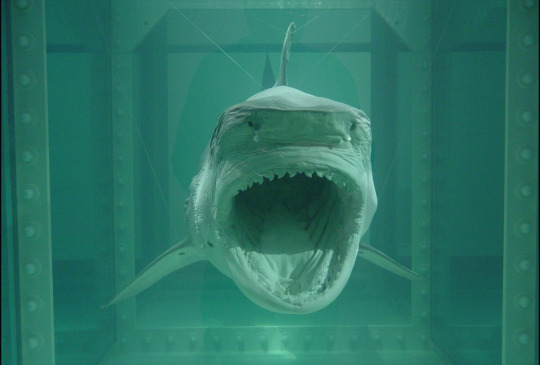
After looking at the art for a few minutes and doing my research about the artist and on how the art was impacting people, and I can agree that the way I thought about art did change when I looked at it. I first thought that it was a simple “shark” picture but after informing myself about the author and the theme I could see and understand that a glass tank means more than it for the shark I researched that it represents a powerful image of an animal. I can also see a difference in art now after reading about the artist and the image of the shark. We can’t just judge an art/image just by seeing it, we have to inform ourselves and analyze it, I can definitely try to understand more deeper into the artist and the art they create.
2-ART AND WRITING-
I made this paint with my best friend when she came here visiting me 2 years ago. We’ve been friends since kindergarten and we decided to make this painting because of our friendship. We used pencils to draw the turtles on the canvas then acrylic paints to paint it. I do think it’s beautiful, it has such a significant feeling in my life because I made it with someone I consider family. I hope you give me some corrections if it could’ve been better!
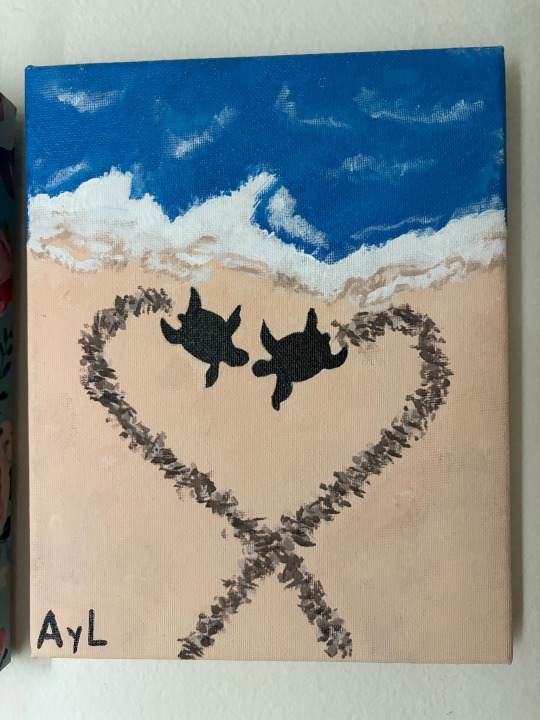
3-WRITING A SELF-PORTRAIT -
*I am 18 years old I’ll be turning 19 on October 9th.
*The gender I primarily align with is female.
*I am from Venezuela, a country from South America next to Colombia and Brazil.
*My ethnicity is Hispanic.
*For fun I be dancing or cooking.
*I’m not a member of an organized group.
*I don’t work but I used to work at chick fil a, I prefer to stop working so I could focus more on school.
*Everyone is unique by their own thing, but I think I’m unique on how my life experiences are not the same as everyone, coming from a country where the political system is really bad it’s not easy!
4. ART PROJECT (SELF-PORTRAIT) –

0 notes
Text
virtual sketchbook one
2. I got artwork number 15, titled, "The Gates" by, Christo and Jeanne Claude 1979-2005. Here are five facts I learned about the assigned art and artist.
The project "The Gates" took nearly 30 years to be realized since the idea was first conceived, the project lasted a period of about 2 weeks in New York's one and only Central Park.
There was a little over 7,500 gates spanning 16 feet tall and going on for 23 miles in all directions of Central Park's Walkways.
The pair Christo and Jeanne Claude met in Paris and were later married in 1959.They shared the love of complex and elaborate projects, that sometimes took years and maybe even decades to be realized.
The pair received the 1995 Praemium Imperiale award, which highlights extraordinary contributions for promotion in the development and progress of the arts.
The artwork was made so that it wouldn't change the environment that it is displayed through at all. For example, there were no holes drilled to make the steel for the legs in the gates.
3. Yes, absolutely, my perspective from the initial glance at this artwork has changed the more that I look at it. I do see something different now in the artwork. Initially I thought that the gates symbolized the perception of our environment how something such as a sidewalk can have such significance that is often overlooked by many. However, now I've come to think of the idea of "The Gates" as a passage of time. The project took decades before it was eventually realized and throughout this time there was much preparation in order to make this idea a reality. The "Gates" symbolizes the aforementioned passage of time, while the surrounding park tells a greater story. This being all the choices and decisions the artists needed to make in this passage of time.
Here is a photo of the artwork:

The painting I have selected is precious to me, not only is it one I enjoy but the painter Marcus Jansen is also my uncle, my dad's cousin. The painting is titled (decolonize #18) and was released (2024). The media used to create this work was acrylic paints on arches paper through the process called (monotype), using a gel pad to achieve the effect he wanted. Which is like works in the series called “Decolonize.” The art serves a use as a cultural enriching tool to find something unique that reflects contemporary times to our visual history purposes. I do think that this painting is beautiful, it is something my uncle worked hard to produce and shows his grit and determination for the arts. This gives me a sense of pride in this painting and his artwork. I also enjoy the meaning of the painting and how it literally paints a picture of colonial figures and the power and supremacy these figures had over that of many.

While I dug deep to find the baggage that has followed me in art. I bring along a very analytical and personal perception when I look at art. I try to find a sense of empathy in artwork. I feel that in life, especially today, people tend to not be emphatic towards each other and I have experienced this firsthand. This is why I bring the “baggage” mentioned before with me. I am 19 years old, the gender I align with is a male, I was born in New York but have grown up and been raised in Florida since an early age, I am ethnically mixed, my father being Caribbean and my Mother European. Additionally, for fun I like to go to the beach with friends and my family, especially to watch the sunset. I am a member of the FBLA and HPSC clubs at SCF (State College of Florida,). I work at a restaurant. Some things that I feel make me uniquely me is my passion for wanting to take care of my family which can be seen in how I am profoundly serious about finances at an early age (especially the stock market). I have been trading stocks ever since the day I turned 18. This has made me in a sense disconnected from material objects and monetarily needs. This has made me put more weight on family values and the needs of others before myself, most importantly their perspective.
In my daily life I am always so fascinated by the complexity of nature and how so many individual things work so well with others. Also, I am always so curious about space which is translated into my curiosity of people and their decision making. Lastly, the biggest thing in my daily life is the fascination to do better than the previous day. Here is a self-portrait which describes me.

1 note
·
View note
Text
JANUARY 22, 2024
Works of Art
Tim Southern (Massachusetts, USA)
"We are what [God] has made us, created in Christ Jesus for good works, which God prepared beforehand so that we may walk in them." - Ephesians 2:10 (NRSVUE)
"One day at lunch, I went with a friend from work to the nearby Institute of Contemporary Art in the Boston Seaport District. I confess my tastes lean more toward the masters, and I sometimes struggle with contemporary works of art. But that day, I saw several pieces that intrigued me. They were created from repurposed materials like scrap metal, old paper, and cardboard. Without having read the exhibit label on the composition, it would not have been obvious what medium was used. The old materials had been made into something new.
Something like this happens when we come to Christ. God turns all the stuff we bring into our relationship into something new. This transformation will likely be a gradual process; for although God can picture the final result, often the material needs to be reworked in the creation process. As God’s finished creation, we will find all that was once there — our addictions, brokenness, heartache, and selfishness — is being shaped into God’s masterpiece." God can transform anything. Every imperfection will be wiped away to allow our perfect view to shine.
TODAY'S PRAYER
"Artist God, we give thanks for your transformation. Help us to be patient and to accept that change is not instantaneous. Open our hearts to the new possibilities of who we may become. In Jesus’ name we pray." Amen.
Ephesians 2:1-10
"1 At one time you were like a dead person because of the things you did wrong and your offenses against God. 2 You used to live like people of this world. You followed the rule of a destructive spiritual power. This is the spirit of disobedience to God’s will that is now at work in persons whose lives are characterized by disobedience. 3 At one time you were like those persons. All of you used to do whatever felt good and whatever you thought you wanted so that you were children headed for punishment just like everyone else. 4 - 5 However, God is rich in mercy. He brought us to life with Christ while we were dead as a result of those things that we did wrong. He did this because of the great love that he has for us. You are saved by God’s grace! 6 And God raised us up and seated us in the heavens with Christ Jesus. 7 God did this to show future generations the greatness of his grace by the goodness that God has shown us in Christ Jesus. 8 You are saved by God’s grace because of your faith. This salvation is God’s gift. It’s not something you possessed. 9 It’s not something you did that you can be proud of. 10 Instead, we are God’s accomplishment, created in Christ Jesus to do good things. God planned for these good things to be the way that we live our lives." Everything about us is from God. He is the reason why we are successful in things. Also He is the reason that we have a bright future ahead. I am blessed! Joe
0 notes
Text
How Jack Thorne's 'His Dark Materials' wanted it both ways
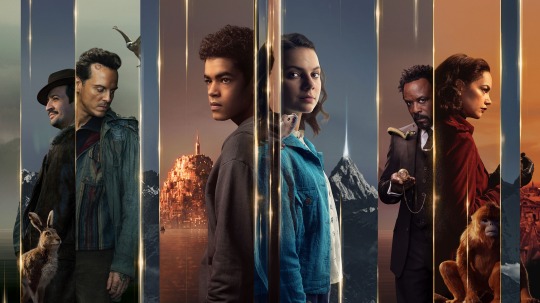
Despite the cast and crews open love for the novels, and the insistent diligence to stay as faithful to the source material as possible — even trying to fill in many of the gaps in the books, as seen in all three seasons of the show — the BBC adaptation never manages to capture the spirit (the only time I felt like it did was in the third season) because of the fact that every character is altered and changed. Not just adaptationally changed either like making a character dumber, softer or harder. They’re completely different characters, separated from the source material e.g. Mrs Coulter is changed from a seductive, calm character to a feral, suicidal character. I must admit, I did like the expanded self harm element that she causes her daemon. However I felt in the novel, if she were to harm her monkey, it would be ‘to keep her lust for power at bay’ rather than shame for herself.
The atmosphere was off yet the events were similar and the complete opposite at the same time. But you can’t have similar events play out with different characterisations, at least not with ‘His Dark Materials’.
Philip Pullman’s characters in ‘His Dark Materials’ are extremely charismatic, but to put it lightly, are not very palatable to say the least. As stated in @clarabosswald’s analysis, there seemed to be this weird need to make EVERY single character digestible or palatable in some way or another in the BBC adaptation, regardless of it making sense or not. I noticed this upon my re-read of ‘The Northern Lights’ that they even humanised the doctor that sexually assaulted Lyra by grabbing Pantalaimon, which was very troubling.
Now with the opposing ‘The Chronicles of Narnia’ film, they changed the characterisations to make them more sympathetic and accessible to a contemporary audience. They even dug deeper with the character Edmund which I thought was a fantastic choice. But the reason why those character changes worked was because C.S.Lewis was not concerned with building character, he was much more concerned with the place of Narnia itself. He almost used his characters to explore the world of Narnia, e.g. some characters would leave one book and come back 5 books later — which is why some of the later adaptations of Narnia didn’t do as well in the box office as the first one.
The character changes in that film enriched the story without effecting it in a way, because ‘The Lion, The Witch and The Wardrobe’ and the other books are driven by the plot. Where as ‘His Dark Materials’ is primarily driven by characters.
Philip Pullman in total contrast to C.S.Lewis, built the world (you could say he used the world) around the characters in order for them to get to Point A to Point B. But he was not concerned about exploring the multiverse so you could see the entire picture, like with C.S. Lewis.
I heard once that he described writing as wondering through a forest on a path and the path is your story. Theres a difference between the story world and the storyline. And as an Author, your concern is the storyline. It would be easy to step away and stray from the path and explore the forest and admire all the trees, but for him the most important thing to do was to remain on the path and focus on the story rather than the details along the way.
I’m not apposed to different versions of the characters or different storylines. But with ‘His Dark Materials’, those books are driven by specific character traits. And the fact that they changed them, while still being faithful to the events in the story, the story beats either don’t land or don’t hit as hard or don’t make sense altogether.
More specifically with the main characters Lyra and Will, but mostly Lyra since she’s the heart of the story.
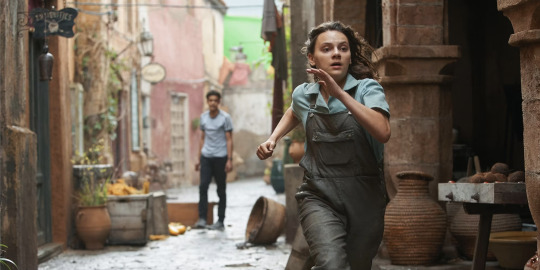
Lyra is first and fourmost a liar, which may seem a small part of her character but its huge. Her ability to lie and get her way out of situations is the cause of many events in the books. She’s feral. She’s wild. She’s manipulative. She’s described as a ‘half wild cat’ and a ‘greedy little savage’. She can’t sit still or behave herself. She’s impulsive. She’s a leader. She gets into fights. She gets dirty. She spends all her nights on the rooftops. She’s an extrovert. She’s street smart. She’s selfish. She’s brave.
She’s an emotional and passionate human being. Thats what makes Lyra a real girl, not just a character on the page. These nuanced character traits of hers is how she pushes everything forward in the story.
All of those negative/positive aspects of her character in the books were watered down so much in the series. To the point where alot of them were removed. Not only is that incredibly dehumanising but makes the plot points where “she lies” not land as well or plot points revolving around her “telling the truth” make no sense at all.
The whole reason why she’s called Lyra Silvertongue is because she tricked the bear king with her lies, a trait which is consistent throughout the entire story — but completely nonexistent throughout the show. Her tricking the bear king in the adaptation came off as a lucky experience rather something that comes naturally to her. Even the ironic plot point of her being given the Alethiometer “a device that tells her the truth” didn’t hit as hard. They tried to establish her as a ‘liar’ in the second episode of season one then gave up completely as the show continued on.
But the weird thing is, those flaws were still mentioned by other characters in the show, when it was not the character they were developing. Characters would mention that she’s a liar, insufferable, selfish or that ‘she doesn’t apologise easily’ — which seemed like an over exaggeration since the show version of her isn’t really any of those things. This applied when characters such as Lee praised her for being ‘brave’ and ‘good’. I heard a HDM podcast recapping season 2 saying that “her character in the show wasn’t hitting the right emotional beats” to be a child of a great destiny that every character seemingly falls over themselves to give their lives for her.
TV Lyra hasn’t completely lost her flaws, but she’s not as nearly as flawed as she was in the books. She felt so contained, rather than passionate. Which felt so odd because yes, Lyra grows out of some bad traits such as her rudeness, due to the influence of Will. But she isn’t naturally like that.
They changed her so much, but also tried to keep her “the same” that her character growth which is huge in the books felt like nothing had moved at all. It kind of got reduced to a simple thing like her innocence being taken away. It was like she wasn’t allowed to have any sort of loud, dislikable reaction in any way. It felt like they were taking away her agency.
And I know one of the biggest reasons why they changed her behaviour in the TV Show is because they aged the character up to 14–16 at the start. I get it. Theres a huge difference between 12 and 14 in terms of maturity . It works for the Will & Lyra romantic scenes as an adaptational choice later in the story (because she’s allegedly 12–13 in the books).
I think Dafne Keen was an inspired choice for the role of Lyra, since I saw some scenes of her in ‘Logan’ and I 100% believe she would of pulled off Book Lyra given the chance, but by the time they started filming she was already 13/14. And in all honesty, Lyra just becomes odd looking older. She’s just not convincing as a misbehaving little girl who can’t sit still, she just comes off as a really strange child thats immature or lacking in social skills. For example, there’s a scene between Mrs Coulter and Lyra in ‘The Idea of North’ where she’s telling a lie, but it doesn’t come off natural because 1. They didn’t establish her as a liar immediately and 2. Part of her ability to lie comes from her spontaneous nature of being a kid telling stories and using her imagination. Dafne Keen didn’t really look that age, for it to look like something she would do.
They also made her relationship with Roger more of a focus in the show, which makes sense as her motivation in the later half of the books comes from wanting to rescue him. However, they made him ‘the only friend that she has’ which I found to be a strange decision because Lyra in the books has tuns of friends. I would say their friendship is more balanced in the series, where as in the book it wasn’t so much.
She forgets him a few times while staying with Mrs Coulter in the book where as she remembers him constantly in the episode ‘The Idea of North’ which felt like a confused choice to me. They were trying to have it both ways; have her be seduced by Mrs Coulter while also actively asking her to look for Roger.
The imbalance in Roger and Lyra’s friendship is important because it adds to the need to set things right with him in The Land of the Dead. It goes to the core of how everyone thinks she is selfish. She needs to save Roger to prove to herself she’s a good person.
In the dreams she has of him in The Land of the Dead, her and Roger have constant talks of how much he’s suffering. In the show, she just has alot of ambiguous flash forward dreams of Roger, with the story not prioritising them as important as the main plot of ‘Asriel’s War’.

When she brings this up to Will in the episode, he dismisses it instead of agreeing to go (like in the book) because of his daddy issues, no I’m sorry, because of Asriel’s War which makes sense as it’s one of the main plots in the season — where it was more of a distracting B plot in the book — but it just kind of adds to the idea that “its unnecessary” or “why are they doing this?”.

The desire to get to Roger and apologise in the show doesn’t hit as hard because there was more of a balance in Lyra and Rogers relationship plus the changes to her character just made it seem like “she just wanted to do it” rather than it being the most important decision she ever makes, to try to better herself.
While they go to the suburbs of the dead, Will and Pan constantly question why she’s doing this (a conflict that was not in the book — Will is steadfastly loyal to her by this point and Pan is too shivery to speak) while Lyra just snaps at them, making her seem mean for no reason. When she has a chat with her death, she doesn’t lie that an angel told her to do it (because they didn’t establish her as a liar properly), she just says that she wants to be good which is not a convincing argument considering what happens next.
When Pan and her have the argument while she leaves him on the doc, which is a great scene on its own (it made me cry), it also adds to the unnecessary nature of it all. It’s a scene that makes sense in the book because of Lyra’s impulsive nature, but because of her seemingly calculative nature in the show, it just looks odd. It’s described in the book that if Lyra had heard Pan speak, she would have folded and never would of got on the boat, but since the show did the complete opposite of that, It makes the scene more harsh and cold.
I think what the writers were trying to do was make it more of a mystery like ‘why is she doing this’ ‘its not too late to turn around’ a mission that appears fruitless at first, but turns out to be the greatest act of humanity — but again, I still don’t think that works because of how much Lyra’s entire character is changed. The act is not just for everyone else. It’s a major step in her character growth, to care about others.
In the Land of the Dead, obviously they had to cut out the whole section where Lyra literally looses her ability to lie while she’s telling lies to the harpies, then learns to tell the truth to the dead. This is the final step for Lyra’s character, finally learning the power of telling the truth instead of lies. They didn’t replace that with anything, only with her telling the dead true stories, which was heartwarming on its own, but obviously those story beats don’t hit as hard in the same way because like I said, its not presented as the final step in her character growth, its presented as a one off scene. This is one of the reasons why her character is pretty static in the adaptation.
In the Land of the Dead, its Lyra for the most part (apart from one instance) that keeps a cool head, while Will looses his — which again, the complete opposite. In the books, its Lyra that goes off the rails and its Will that keeps her centred.
Which brings me onto how the character of Will is changed in the adaptation, and how that effects the story from the second book onwards.
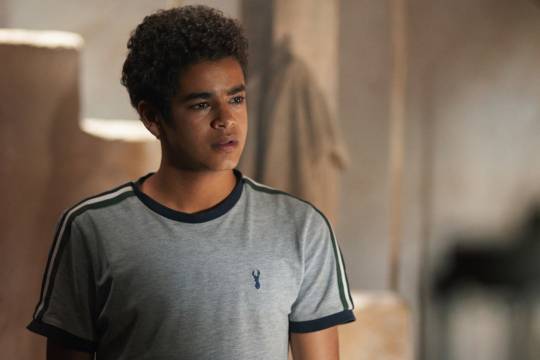
Will was brought in by Philip Pullman in ‘The Subtle Knife’, to represent Lyra’s other half — in another parallel universe literally, and also to help her on her quest to fulfil the prophecy. If it was just her on her own with Pan, it wouldn’t work and would fail.
Though I was taken aback by his entrance in ‘The Subtle Knife’ — as it was such a jarring change coming from the suspenseful cliff hanger where Lyra walks into the new world after her best friend Roger got murdered — he quickly but surely became my favourite male literary character of all time.
I don’t have as a big of a problem with his character changes then I do with Lyra, because there were at least a few times in the show where he was allowed to act like ‘himself’. Amir Wilson was perfect casting as Will. It was like the character had just walked off the page it was that good. But all together, he’s a completely different character — which I can understand. Out of all the characters, I feel he’s the hardest to pin down and his development is done in a subtle and subconscious way.
Throughout the course of ‘The Subtle Knife’, he’s incredibly off putting as he’s mostly angry and tired and then he’s in pain because of his knife wound. It works in a book format, because your’e in his point of view and you understand that he’s a child thats at the end of his tether. But it would be hard to portray that in a nuanced way on screen, unless your’e clever with it.
They unfortunately took the easy route with his characterisation on screen by making him softer. Not only that, the writing for his character was incredibly inconsistent at times.
Will from the books is fierce. He’s frightening. He’s stoic. He gets angry. He’s a strategist. He does whats best for someone. He likes to stay invisible. He’s sarcastic. He's an introvert. He likes to stay hidden. He’s practical. He’s a child carer. He's naturally aggressive e.g. He beat up a bunch of boys at school because they were hurting his mother. He hardly smiles. At times, especially in the second book, he becomes incredibly depressed. He's pretty much a 35 year old man in a young boy's body. He’s incredibly soft, but the reader can’t tell until Lyra brings that out in him.
I would say Will is a more contained version of Lyra, yet the complete opposite of her. They’re like yin and yang. They both have something that the other lacks, and that helps them both grow up. Lyra brings out a softness out in him, brings out his impulsive nature where as he helps her strategise and learn not to just rush out and do things.
TV Will suffers from the same problem that TV Lyra does.
Every negative/positive aspect about him is watered down. Revealing a quite mild character. I feel that they didn’t touch on the fact that he was a child carer enough, which is a huge part of his character. It just came off as ‘he loves his mum’ more in the show. Will being a caterer is supposed to contrast Lyra whom didn’t grow up with parents and got to live out a childhood that he was never allowed to experience. This is a theme. Every character trait that contrasts Lyra in the books isn’t present so much. I would even go as far to say that they’re too similar in the TV Show.
I was wondering throughout the second season why the storyline was static and wasn’t going anywhere. Certain plot points such as Will being a murderer, Lyra helping Will find his father, The fight for the subtle knife and Will becoming the bearer of the Subtle Knife felt tacked on or weren’t hitting as hard as they should.
At first, I thought it was because the novel was ‘the weakest in the trilogy’. I often see ‘The Subtle Knife’ as a bridge between both ‘Northern Lights’ and ‘The Amber Spyglass’.
But since re-reading the book, I went ‘Oh my God, its because they changed Will’s character arc’.
TV Will, the more I think about it, does not suit becoming the bearer of the subtle knife. The only times we see him fighting is in the boxing ring. He expresses incredible regret over killing a man instead of brushing it off because he was protecting his mother. Even when he’s under threat, he says ‘I don’t want to hurt you’ He even has to be persuaded to fight. There’s even a moment in the show where he says “Maybe we’re better off not fixing the knife at all.” which kind of dismisses the practical nature of his character in the book. Plus the knife being a part of him, the same way as the Alethiometer is a part of Lyra. Even the remarks that Lyra makes about him being similar to Iorek the armoured Bear don't make as much sense, because of the fact that he's softer.
Book Will struggles with his warrior nature, and eventually learns thats not who he wants to be. But he isn’t naturally a soft person. He learns to be through his experiences and his relationship with Lyra. Which is why it was so odd to me that they included the line in the show where Will is saying to his father in the Land of the Dead “You told me that I was a warrior; That I can’t fight my nature. Your’e wrong.” I was just like, what are you talking about? That is so not the character the show had developed. TV Will had hardly been shown to fight anyone of his own free will — it didn’t make sense to me. They were trying to have it both ways. Completely ignoring his basic character traits and flaws, yet still going through the same arc (a somewhat watered down one) one e.g. idolising his dad for his whole life, realising his dad ain’t shit when he meets him, finding Lyra missing, ignoring the task his father set him etc.
Even the task that Lyra has to help Will find his father didn’t land as well because of the fact that the two of them were bonding straight away in the show, instead of it being like ‘oh no we’re stuck with each other’ to this slow process of her and Will learning to trust each other.
I understand that you have to translate Lyra and Will’s relationship alot differently in a Show format, because subconscious development doesn’t really work due to the lack of intimate point of views. The more something is changed in an adaptation, the more it stays the same.
I have openly praised the shows depiction of their relationship in another analysis I wrote (before i re-read the books) and how I loved how they gave them more soft moments. However, I will admit now that the soft moments that they had in season 2 felt off to me because they weren’t in character. I think, looking back I would of preferred more soft moments if they were in character.
Will’s initial softness towards Lyra in the show is partially to do with TV Lyra being much less feral and less of a threat. As a result their journey is warmer and far less angstier than it was in the books.
And that in turn messes with the tension.
The element of Will being slightly dismissive of her at the start, is important to how certain story beats land. It adds to the ‘OH SHIT’ when Lyra’s been taken and the task that his father set him that he’s been dreaming of his whole life suddenly isn’t important to him anymore. Thats why it’s such a big deal when he spends most of his time through ‘The Amber Spyglass’ looking for her.
But in the season 2 finale, it ends with Will going off into the sunset, presumably to fulfil is fathers wishes. Then in season 3, he finds her missing, goes ‘whoops’ and then there's a montage of him trying to find her. Then when he does (quite easily) — he goes on about how “since his dad died he’s done none of the things that he asked him to do’ which makes him looking for Lyra within the show feel even more anticlimactic.
Also, this is more of a personal opinion that an analytical one, I did not appreciate when Lyra brought up going to the Land of The Dead, TV Will went “I saved you. I did everything I could to save you. You told me not to but I did it anyway” which felt to me like ‘Wow brilliant, of course you had to save her’
And instead of agreeing to go to the Land of the Dead with her like in the book, they had to insert some tension from 'The Subtle Knife' (because they messed with the tension in season 2) and have Will go on a rant about what his dad wanted him to do, Asriel’s war, dismissing Lyra’s wishes and even having him suggest maybe her dad regretted killing her friend.
This is something that Will from the books would never ever say, let alone to the girl that he loves. He's fully aware how much her dad hurt her and he respects her too much by that point to ever suggest something like that. Even when he does think about ‘what his dad wanted him to do’ he’s still steadfastly loyal to Lyra. They were completely undermining the turning point in their relationship and Will’s character development by adding pointless drama to extend the episodes running time.
As mentioned in a very articulate post by @mamsellechosette24601 ‘the quest to find his father and fulfil his fathers wishes’ isn’t the point at all, its Will letting go of his childhood dreams, of realising what really matters is Lyra all along.

Now I’ve seen in another analysis of the adaptation that their path to falling in love in the show is alot clearer than in the books which I can understand and agree with (to a certain extent) because the books were much more concerned with philosophy than romance. This is true for the romance between Asriel and Marisa in the Book vs the TV Show as well.
The concept behind their relationship remains the same:
“Will and Lyra are very good people who learn to trust each other when they’re at their most vulnerable, they become the only thing they have in a terrifying world of enemies. By the end, when they realise they’re in love only to discover they can never be together, they make the mature choice, however hard it may be.”
But their relationship is totally different in the TV Show because of their character changes.
I would say Lyra and Will have more of a enemies to lovers storyline in the books - where as the adaptation version of them doesn't. The screenwriters clearly tried to iron out alot of the problematic elements, especially in the beginning and focus on them being "friends" more. I'm not apposed to them doing that, but the way they did it ended up muting a few of their scenes together.
I’ve actually made an argument in my other account (against the ‘His Dark Materials’ analysis saying that ‘the adaptation did a much better job at showing when Will and Lyra fell in love’) that their relationship development was a lot subtler in the books because the characters were alot younger and more immature. And that it was more ‘obvious’ in the tv show because they aged the characters up, therefore they could have more mature conversations and scenes together.
This was before I did my re-read.
After re-reading ‘The Subtle Knife’ and ‘The Amber Spyglass’ comparing it with how their relationship is handled in the TV Adaptation. I would actually argue the opposite .
In some ways, the growing romance between the two of them is much more mature (and makes more sense) in the books than in the show, at least to me. Unlike in the TV Show, their relationship never enters into neutral territory, even when they finally learn to trust each other. Theres much less emphasis on their ‘friendship’.
After their brutal first meeting — where they attack eachother — in ‘The Subtle Knife’ Lyra is immediately taken with Will and constantly thinks about him and what he thinks of her. There’s even a moment in ‘The Amber Spyglass’ where she’s trying to hide that she’s in pain while they’re walking (because of all that time she’s been asleep) because she doesn’t want to appear weak in front of him.
The way Lyra and Will meet in the show, is reminiscent of how children meet for the first time. Though quite skeptical of each other, they instantly bond and make friends after 5 seconds, because why wouldn’t they? They’re kids the same age after all. Even though there’s still an element of mistrust there, there’s hardly any conflict between them. They don’t play off each other as much. There is one moment where he gets angry at her for making him wait, but all that is solved in a minute because of Lyra’s ‘calm nature’
Even when Lyra gives Will away by accident and says that she lost the Alethiometer, he doesn’t shout at her. There are few comments here and there but theres no real tension between the two of them.
When Will and Pan have a conversation, its presented as Pan going up to him to have a chat after he had a bad dream rather than Will finding the courage to speak to him in the book and saying ‘I think Lyra’s the best friend I’ve ever had’. This is presented more as a statement in the show because their friendship has already been established and less of a discovery (as he wasn’t reacting to her that much in the book as he had alot on his mind).
Lyra and Will even have a talk about Pan’s conversation with him afterwards in the show. But in the book, that never happened. It’s mentioned later but never discussed, because of the fact that it was a private conversation between Will and Pan.
You could say this was another problem that the adaptation had. It’s mentioned multiple times ‘YOU CAN’T TOUCH SOMEONES DAEMON’ but not emphasised why thats the case.
In the books, it’s heavily implied that touching someone else’s daemon is the equivalent of touching someone’s genitals. There’s a moment in ‘Northern Lights’ where Lyra and Iorek find Tony in the fish house without a daemon and Pan wants to comfort him but holds back because of the taboo. Thats why it’s such a big deal when Pan comforts Will and starts licking him in the book.
In the show, its quite an underwhelming scene that lasts 5 seconds where Pan strokes Wills fingers and Lyra says in a quiet voice ‘In my world, your’e not supposed to touch someone else’s daemon but you didn’t do something wrong’
And don’t get me started on the 5 second panning away shot where they’re finally touching each others daemons, instead of the moving moment from the book. It didn’t feel like they really understood the gravity of what those scenes meant and what it meant for their connection.
Again, this is more of a personal opinion. Near the end of the final book, when they enter the world of the Mulefa, Lyra and Will trust each other more than they ever have, which shows how much they’ve both grown since ‘The Subtle Knife’. Mary even describes that she never saw ‘more trust on a persons face’. But in the show, there’s this weird forced tension between them for the sake of ‘romance’. They’re suddenly awkward teenagers with each other — which was not a choice that I liked because it didn’t come naturally.
And when they have to be ripped from each other, a whole page worth of them bargaining to be together is turned into ‘I didn’t think it was possible to feel this bad.’ and ‘This is all wrong’, plus Mary and Serafina being weirdly insensitive while Will and Lyra are in different locations rather than being with each other.
This is possibly why I didn’t feel anything when they had to be forced apart because, the way it was handled felt rushed and soulless. Plus I don't really think that Dafne and Amir had enough romantic chemistry in order for it to work.
Overall, despite there being more ‘soft moments between the two of them’ Show Lyra and Will’s connection feels alot more shallow and simplified.
In the books, I got the vibe that even though they were very young, you couldn’t imagine them being with anyone else but with each other. They were each others other half. They were essentially the only family they had in a world full of enemies. There was never a moment in the books, where they weren’t already in love with each other to some degree. It went beyond the typical romantic duality.
In the show, it felt more temporary. This is mostly due to their character changes (they were too similar in my opinion). Like a connection between friends that became romantic at the end of the journey. And it’s something they’ll get over because “It won’t always feel like this” or “Its much more romantic to live for love than to die for it” or “It might not seem like it now but you have a future”
I think that was one of my main problems with the TV Show, it lacked emotion. Not just as an adaptation, but in general.
More than anything, the adaptation felt too confused. It was trying to reimagine the story while also paying homage to the original material. And thats why overall — despite my enjoyment for some of the episodes especially in season 3 — it didn’t work as well as it should have.
#this analysis is a mixture of my personal and analytical thoughts#if you enjoy the show then thats fine#his dark materials#bbc his dark materials#will x lyra#lyra silvertongue#will parry#lyra x will#will and lyra#lyra belacqua#hbo his dark materials#dafne keen#amir wilson#analysis#hdm spoilers#hdm#philip pullman#adaptation#hdm shitpost#hdm season 3#critique#novel#tv show#review#tv show review#the subtle knife#the amber spyglass#panjava#silverparry#jack thorne
193 notes
·
View notes
Photo

Redesign Prompt RESULTS!
Alright, thank you everyone who has voted, the results are now in! Overwhelmingly our winner is Ranmao 🐈!


First of all, I need to insert a few caveats here. Unlike with Victorian fashion, I do not have years and years of studying of Qing dynasty-fashion behind me. So whatever results I show here are the product of a fortnight of reading up and meticulous studying of contemporary photographs. a.k.a. I am merely scraping the surface here. But! I do promise that everything shown here is done to the best of my ability to be responsible as a content provider.
Now without further ado, let us dive into Ranmao’s current design, the blatantly obvious inaccuracies, and how I propose to redes...ign... her outfit while keeping the original intact as much.... as possible???? Heck, this is not even worthy of being called a ‘redesign’, this is straight up designing from scratch!

Hair
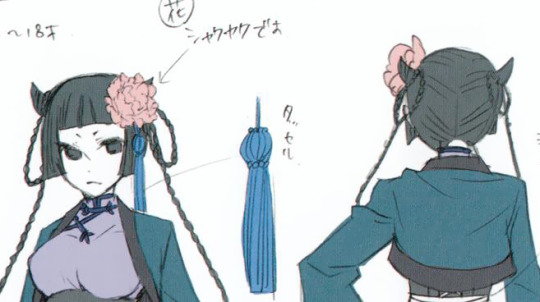
Let us start with her bangs. Her bangs are in fact surprisingly accurate, as late Qing dynasty women would wear their bangs in a variety of Bettie bangs trimmed well above the eyebrows. Having sides of the bangs growing longer framing the face was usual too, though they would be cut slightly thicker than Ranmao’s. Though, we don’t know how much hair Ranmao has, so I see no reason to alter it.

Twin braids are very much associated with the “China doll look”, but they seem to have been branded into our image of the “Chinese Girl” because it was the go-to look for unmarried women in Republic China (which is many years later than Ranmao’s time, and also has more surviving images.)

In Ranmao’s time, unmarried girls would either wear the bottom part of their hair down, or have everything tied into a single braid behind them. Girls who preferred a more feminine look would often decorate the sides or the top with flowers or other ornaments depending on their wealth.
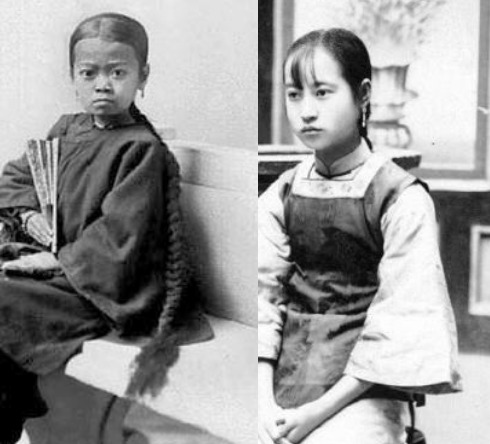
Yana’s notes say that the flower in Ranmao’s hair is a Chinese peony, which is also called the Empress of Flowers in Chinese as well as Japanese culture. I could find sources on how the peony was the symbol of the Empress of China, and how one better avoid wearing any type of peonies around the Empress herself for fear of being suspected of disrespect. But I could not find any evidence of such flowers being banned for other people, so presumably it was more an ‘unwritten code of politeness’ rather than fashion law.
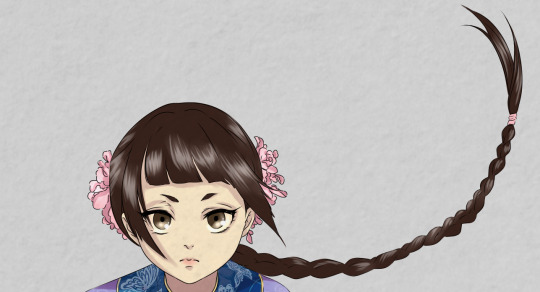
Hence, I kept the pink peony design for Ranmao, and decorated them in the way Qing women would have.

Neckline
By far the most interesting thing I learned from this redesign attempt was that the “mandarin collar” - the thing that pops up first in most people’s minds when thinking about Chinese fashion - was in fact not at all common.

In this academic work on Chinese fashion history, Finnane writes that the ‘high collar’ was “not a common feature of costume before the twentieth century.” Instead, most costumes would have had a round neckline.

Finnane, Antonia. Changing Clothes in China : Fashion, History, Nation. New York: Columbia University Press, 2008. p. 93
The ‘high collar’ gained popularity in early 1900s in China after the Europeans brought with them the beauty standard for high collars, as well as slim-fitted silhouettes. The Chinese increasingly adopted this type of collar and the slim silhouette (the well known ‘china dress/qipao/cheongsam’), and the relatively many early photos that survived helped engrave this stereotype into our minds.

Sleeves
I do not think it requires any mention, but 19th century Chinese fashion did not include boleros... For many of the original designs of Ranmao I can sort of see where Yana got that image from, but this bolero-look truly beats me.

The sleeves worn in the late Qing period were relatively wide, though they were starting to slim down over time. Late Qing women enjoyed much more flexible clothing rules than earlier Qing women, and the width of the sleeves was in great part determined by personal preference, season, but mostly one’s wealth.
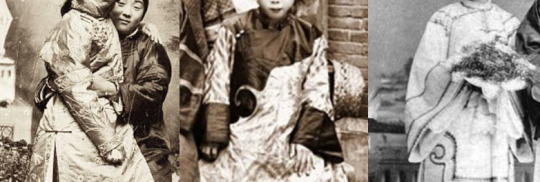
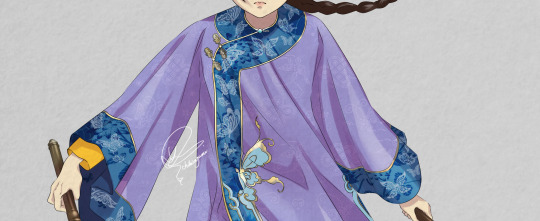
Needless to say, the larger the sleeves the more fabric and embroidery it would require, and thus more expensive. Also, the wider the more it would get into the wearer’s way.
I don’t know how much thought Yana put into Ranmao’s original design in relation to her function as elite bodyguard, but considering how the original has zero practicality and only serves to maximise Ranmao’s attractiveness, I have no qualms about giving Ranmao fairly large sleeves too. Besides, let us assume that Lau is responsible for providing Ranmao with clothes. Illegal money tends to fill the pockets quite deeply, I don’t think he can’t spare a few pounds for big sleeves.

Wider sleeves would expose much of ‘a lady’s precious skin’, as such a more fitted layer would have been worn underneath. (The sleeves under the wider sleeves obviously did not have to be orange-ish. This was merely coincidence that both my redesign and the visual source have this colour.)
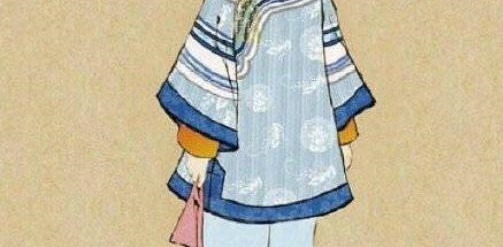
Silhouette
The figure hugging silhouette x Chinese clothes was - as mentioned above - not at all a thing in Ranmao’s time. In fact, the accentuation of the “female curves” was considered very inappropriate if not downright ugly in the Qing dynasty.
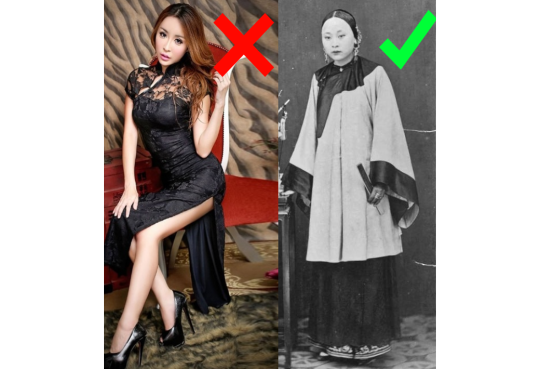

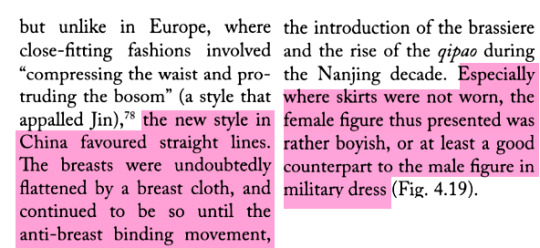
Finnane, Antonia. Changing Clothes in China : Fashion, History, Nation. New York: Columbia University Press, 2008. p. 94
Yana’s notes mention that the thing Ranmao wears is just an European corset and that that is the only thing ‘English’ about her attire.
Well... I don’t know where the idea that Victorians wore corsets on the outside comes from, but I myself admittedly was fooled by this a few years ago too... I promise you all now however, Victorians decidedly did not wear their ‘bras’ on the outside. I think even now this look is considered rather ‘questionable’ by most people.

Instead, Qing dynasty clothes were mostly cut wide and straight, loosely dangling around their bodies offering maximum comfort and space. You feared Ranmao killing you in her corset? Now tremble before her now blessed with maximised agility.

Trousers
Well... I considered ‘translating’ Ranmao’s attire to 2020 standard like I did for O!Ciel, but that would not be Tumblr-filter approved. Skirts so short they could be mistaken for a belt are nothing too surprising today, but wearing one with a split that deep is probably a bit too revealing even by today’s standards.

By the late Qing dynasty, men and women, rich and poor alike predominantly wore trousers. Long robes (skirts) were definitely in fashion too, but they were reserved for those who could afford to not have much agility. If you were a farmer, robes would not have been your first option. Perhaps the way long skirts were viewed by the Qing Chinese was not unlike the way we see them now; ‘more classy’ ‘more feminine’ and ‘less convenient’, but not the only way to express femininity.
In these pictures below we can see relatively rich women, married and unmarried alike, all wearing trousers.

Ranmao is predominantly a fighter, and as trousers are plenty feminine in Chinese fashion culture, I don’t see why she would not choose to wear trousers instead of a restricting long skirt. Hence I gave her a pair of trousers.
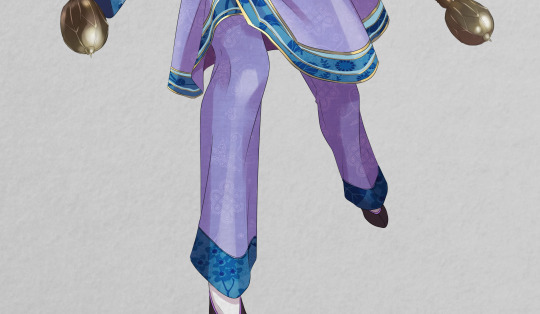
Shoes
Like I said before, “the shoes are correct...” But the anklets definitely are not!

Golden or silver anklets are something that are worn by very, VERY young children in China. Even to this day it is customary among many Chinese people to gift newborn children at least one piece of pendant, bracelet or anklet, for it is believed to bring the child luck. More practically, this piece of jewellery will become the child’s first piece of property then, which can be sold later SHOULD they ever run into a financially difficult situation.

These anklets or bracelets would not be removed from the child unless they have outgrown them, which happens fairly quick. Ranmao who is probably full grown should have outgrown them at least ten years ago. Hence, seeing these things on Ranmao would probably make it look like she is still wearing diapers or bibs.
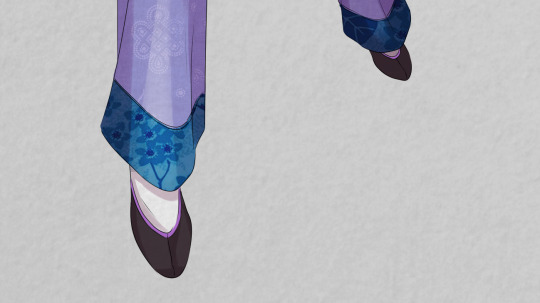
Chinese people would likewise not have worn shoes barefoot. Instead, they would have worn cotton socks which were mostly white.
DOUBLE HAMMERS
HERE COME THE WEAPONS! Luckily Yana wrote the following note or I would never have guessed what they are for my knowledge about Chinese weapons is next to nothing.
“These are【SUPER】heavy. They are weapons called 双錘 (double hammers) and they in fact exist. I heard these were used by power-type warriors.”
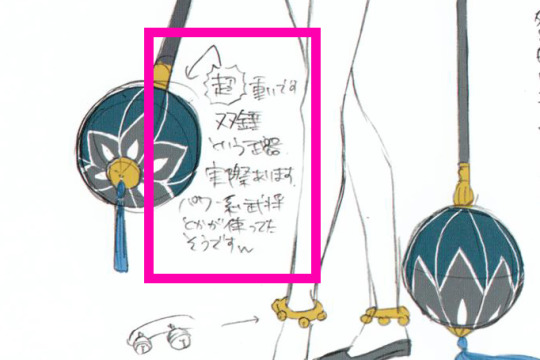
So, I googled 双錘 and it turns out that the type Ranmao is holding do indeed exist! But... only in fiction and theatre.
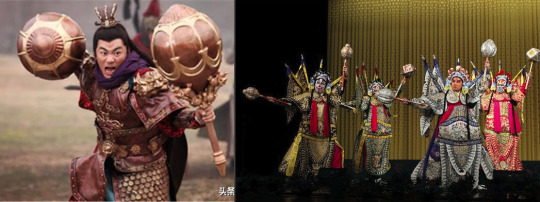
The hammers that were used in actual combat were either very thin and long, or short and plump. Such hammers were one of the most primitive metal weapons in China, and quickly fell out of favour among Chinese warriors when more practical weapons such as the metal spear, sword and bows were invented. The hammers mostly retained their value because of their weight in heroic tales and myths about legendary warriors and deities.
I don’t have the full details, but apparently according to some legends or myths, one of such big-ass hammers could deal a force of 200kg, and thus 400kg combined. Regardless of this being realistic or not, it sure does sound very cool! It is therefore no wonder this primitive weapon retains its popularity even today.

Nowadays when these hammers are used, they are either the blown up theatrical versions, or the smaller versions for the sake of preserving martial arts.
I had a bit of a dilemma as to which version to give Ranmao, but in the end I settled with the short and heavy ones because I wanted to keep the idea of this small and innocent looking girl wielding solid metal balls. Two cheer-leading sticks would simply not have the same weight, figuratively and literally.


Alright everyone! Did you enjoy my response to your votes? I hope you did ^^ Non-European fashion history really is not my strong suit, so my deepest apologies if I messed anything up.
Pray tell if I did, I am always happy to learn ^^
#Ran mao#ranmao#ran-mao#redesign#redesign prompt#art#my art#fan art#fanart#fan-art#Chinese clothes#UGGHGHHGHG non-European fashion REALLY is not my strong suit#BUT I learned a lot and I had fun!
1K notes
·
View notes
Photo



Learning About the Present Through Our Past
There are people who would say that students in the U.S. do not get a comprehensive education when it comes to history. So how can we understand our present and work toward our future without a clear view of our past? There may be some schools or teachers who are doing an excellent job, but in many cases we still have a very long way to go. This makes access to thorough and accurate accounts all the more important for young readers. Here are two recent books that could help fill in some gaps.
Revolution in Our Time: The Black Panther Party's Promise to the People by Kekla Magoon [available Sept. 28] (Review copy provided by Candlewick)
Publisher summary: In this comprehensive, inspiring, and all-too-relevant history of the Black Panther Party, Kekla Magoon introduces readers to the Panthers’ community activism, grounded in the concept of self-defense, which taught Black Americans how to protect and support themselves in a country that treated them like second-class citizens. For too long the Panthers’ story has been a footnote to the civil rights movement rather than what it was: a revolutionary socialist movement that drew thousands of members—mostly women—and became the target of one of the most sustained repression efforts ever made by the U.S. government against its own citizens.
Revolution in Our Time puts the Panthers in the proper context of Black American history, from the first arrival of enslaved people to the Black Lives Matter movement of today. Kekla Magoon’s eye-opening work invites a new generation of readers grappling with injustices in the United States to learn from the Panthers’ history and courage, inspiring them to take their own place in the ongoing fight for justice.
A few thoughts: Aside from the middle grade book One Crazy Summer by Rita Williams-Garcia and Kekla Magoon's own teen novels The Rock and the River and Fire in the Streets, not much literature exists for young readers featuring the Black Panthers. That was why I was very excited to see this available for teens, but I think adults will also appreciate it. Revolution in Our Time begins with one of the events that brought the Panthers to national attention, but also goes back hundreds of years explaining many actions and events in history that led to that moment. Readers can see how the organization came together, shaped their collective identity, and got to work.
It's a very comprehensive look at the members and their day-to-day activities, victories, losses, and the many challenges they ran up against. It also includes a look into the many instances of governmental opposition. The Panthers were strong and did want to be seen that way, but their opponents painted them as violent and dangerous and that image is the only picture that many folks still hold in their memories. Here people can see a much more complete and accurate view.
The actual details and the stories are awesome by themselves, but the way that Magoon connects the past to our present makes this an incredibly powerful work. The final sections of the book are a call to action. The Black Panthers' average age was 19. Young people can do amazing things. There's a lot to learn by looking at the past and there's so much potential and opportunity for young people to make change happen today.
From a Whisper to a Rallying Cry: The Killing of Vincent Chin and the Trial that Galvanized the Asian American Movement by Paula Yoo Norton Young Readers
Publisher summary: America in 1982: Japanese car companies are on the rise and believed to be putting U.S. autoworkers out of their jobs. Anti–Asian American sentiment simmers, especially in Detroit. A bar fight turns fatal, leaving a Chinese American man, Vincent Chin, beaten to death at the hands of two white men, autoworker Ronald Ebens and his stepson, Michael Nitz.
Paula Yoo has crafted a searing examination of the killing and the trial and verdicts that followed. When Ebens and Nitz pled guilty to manslaughter and received only a $3,000 fine and three years’ probation, the lenient sentence sparked outrage. The protests that followed led to a federal civil rights trial—the first involving a crime against an Asian American—and galvanized what came to be known as the Asian American movement.
Extensively researched from court transcripts, contemporary news accounts, and in-person interviews with key participants, From a Whisper to a Rallying Cry is a suspenseful, nuanced, and authoritative portrait of a pivotal moment in civil rights history, and a man who became a symbol against hatred and racism.
A few thoughts: It's clear that Paula Yoo did an incredible amount of research and she carefully unraveled many layers of this complicated story. Vincent Chin was brutally killed and though to some it may seem like an isolated event, it happened during a time when there was increasing anti-Asian sentiment brewing. Yoo takes the time to explain many things that had happened contributing to the creation of this environment. She uses the personal history of Vincent's family and even goes back through U.S. history as a whole to see the threads of hatred and racism that had been there over time.
The narrative includes many people involved in the case and explores their lives and actions--and where possible--their motivations. Seeing Vincent's friends and family up close makes the loss very difficult to witness even just via the page.
A powerful aspect of this book is seeing the way people pulled together and spoke up. They formed Asian American advocacy organizations and some aspects of the justice system were even changed as a result of the work done around Vincent's case. Unfortunately, this book is very timely. It was published during a time of rising violence and racism against people of Asian descent in the U.S. Yoo shows readers that our present has come about because of our past, but our past can also inform and inspire us.
Here are links to a few more YA nonfiction history books that we've featured in the past:
An Indigenous Peoples' History of the United States for Young People by Roxanne Dunbar-Ortiz adapted by Debbie Reese and Jean Mendoza
We Are Not Yet Equal: Understanding Our Racial Divide by Carol Anderson and Tonya Bolden
Stamped: Racism, Antiracism, and You by Jason Reynolds & Ibram X. Kendi
A Few Red Drops: The Chicago Race Riot of 1919 by Claire Hartfield
Courage Has No Color: The True Story of the Triple Nickles by Tanya Stone
Infinite Hope: A Black Artist's Journey from WWII to Peace by Ashley Bryan
They Called Us Enemy by George Takei, Justin Eisinger, Steven Scott, & Harmony Becker
Pipestone: My Life in an Indian Boarding School by Adam Fortunate Eagle
Darkroom: A Memoir in Black and White by Lila Quintero Weaver
The March graphic novel series books 1-3 by John Lewis with Andrew Aydin and artist Nate Powell
In addition to books written specifically for the YA market, there are also some fantastic historical picture books for children, teens, and even adults. Here are a few that are exceptional:
Unspeakable: The Tulsa Race Massacre by Carole Boston Weatherford illustrated by Floyd Cooper
Queen of Physics: How Wu Chien Shiung Helped Unlock the Secrets of the Atom by Teresa Robeson illustrated by Rebecca Huang
Freedom in Congo Square by Carole Boston Weatherford and R. Gregory Christie
I Am Not a Number by Jenny Kay Dupuis and Kathy Kacer illustrated by Gillian Newland
Twenty-two Cents: Muhammad Yunus and the Village Bank by Paula Yoo illustrated by Jamel Akib
Separate is Never Equal: Sylvia Mendez & Her Family's Fight for Desegregation by Duncan Tonatiuh
The Book Itch: Freedom, Truth & Harlem's Greatest Bookstore by Vaunda Micheaux Nelson illustrated by R. Gregory Christie
Fry Bread: A Native American Family Tradition by Kevin Noble Mailland illustrated by Juana Martinez-Neal
Paper Son: The Inspiring Story of Tyrus Hong, Immigrant and Artist by Julie Leung illustrated by Chris Sasaki
A Day for Rememberin': Inspired by the True Events of the First Memorial Day by Leah Henderson illustrated by Floyd Cooper
Overground Railroad by Lesa Cline-Ransome and James Ransome
Soldier for Equality: José de la Luz Sáenz and the Great War by Duncan Tonatiuh
If you are aware of other books we should watch for, please let us know.
22 notes
·
View notes
Text
Fantastic (but long) article about Theater of War’s recent productions, including Oedipus the King and Antigone in Ferguson, featuring Oscar Isaac. The following are excerpts. The full article is viewable via the source link below:
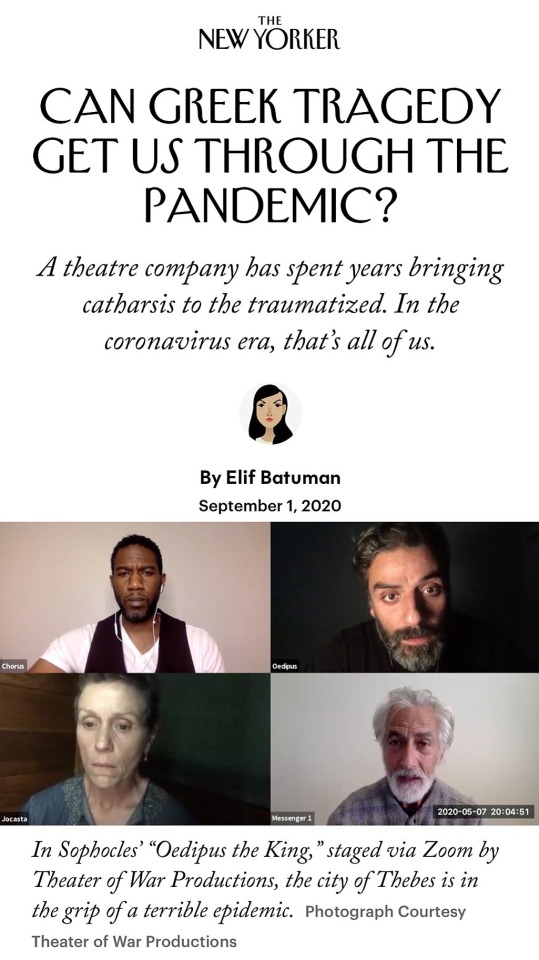
Excerpt:
“Children of Thebes, why are you here?” Oscar Isaac asked. His face filled the monitor on my dining table. (It was my partner’s turn to use the desk.) We were a couple of months into lockdown, just past seven in the evening, and a few straggling cheers for essential workers came in through the window. Isaac was looking smoldery with a quarantine beard, a gold chain, an Airpod, and a black T-shirt. His display name was set to “Oedipus.”
Isaac was one of several famous actors performing Sophocles’ “Oedipus the King” from their homes, in the first virtual performance by Theater of War Productions: a group that got its start in 2008, staging Sophocles’ “Ajax” and “Philoctetes” for U.S. military audiences and, beginning in 2009, on military installations around the world, including in Kuwait, Qatar, and Guantánamo Bay, with a focus on combat trauma. After each dramatic reading, a panel made up of people in active service, veterans, military spouses, and/or psychiatrists would describe how the play resonated with their experiences of war, before opening up the discussion to the audience. Since its founding, Theater of War Productions has addressed different kinds of trauma. It has produced Euripides’ “The Bacchae” in rural communities affected by the opioid crisis, “The Madness of Heracles” in neighborhoods afflicted by gun violence and gang wars, and Aeschylus’ “Prometheus Bound” in prisons. “Antigone in Ferguson,” which focusses on crises between communities and law enforcement, was motivated by an analogy between Oedipus’ son’s unburied body and that of Michael Brown, left on the street for roughly four hours after Brown was killed by police; it was originally performed at Michael Brown’s high school.
Now, with trauma roving the globe more contagiously than ever, Theater of War Productions had traded its site-specific approach for Zoom. The app was configured in a way I hadn’t seen before. There were no buttons to change between gallery and speaker view, which alternated seemingly by themselves. You were in a “meeting,” but one you were powerless to control, proceeding by itself, with the inexorability of fate. There was no way to view the other audience members, and not even the group’s founder and director, Bryan Doerries, knew how numerous they were. Later, Zoom told him that it had been fifteen thousand. This is roughly the seating capacity of the theatre of Dionysus, where “Oedipus the King” is believed to have premièred, around 429 B.C. Those viewers, like us, were in the middle of a pandemic: in their case, the Plague of Athens.
The original audience would have known Oedipus’ story from Greek mythology: how an oracle had predicted that Laius, the king of Thebes, would be killed by his own son, who would then sleep with his mother; how the queen, Jocasta, gave birth to a boy, and Laius pierced and bound the child’s ankles, and ordered a shepherd to leave him on a mountainside. The shepherd took pity on the maimed baby, Oedipus (“swollen foot”), and gave him to a Corinthian servant, who handed him off to the king and queen of Corinth, who raised him as their son. Years later, Oedipus killed Laius at a crossroads, without knowing who he was. Then he saved Thebes from a Sphinx, became the king of Thebes, had four children with Jocasta, and lived happily for many years.
That’s where Sophocles picks up the story. Everyone would have known where things were headed—the truth would come out, and Oedipus would blind himself—but not how they would get there. How Sophocles got there was by drawing on contemporary events, on something that was in everyone’s mind, though it doesn’t appear in the original myth: a plague.
In the opening scene, Thebes is in the grip of a terrible epidemic. Oedipus’ subjects come to the palace, imploring him to save the city, describing the scene of pestilence and panic, the screaming and the corpses in the street. Something about the way Isaac voiced Oedipus’ response—“Children. I am sorry. I know”—made me feel a kind of longing. It was a degree of compassion conspicuous by its absence in the current Administration. I never think of myself as someone who wants or needs “leadership,” yet I found myself thinking, We would be better off with Oedipus. “I would be a weak leader if I did not follow the gods’ orders,” Isaac continued, subverting the masculine norm of never asking for advice. He had already sent for the best information out there, from the Delphic Oracle.
Soon, Oedipus’ brother-in-law, Creon—John Turturro, in a book-lined study—was doing his best to soft-pedal some weird news from Delphi. Apparently, the oracle said that the plague wouldn’t end until the people of Thebes expelled Laius’ killer: a person who was somehow still in the city, even though Laius had died many years earlier on an out-of-town trip. Oedipus called in the blind prophet, Tiresias, played by Jeffrey Wright, whose eyes were invisible behind a circular glare in his eyeglasses.
Reading “Oedipus” in the past, I had always been exasperated by Tiresias, by his cryptic lamentations—“I will never reveal the riddles within me, or the evil in you”—and the way he seemed incapable of transmitting useful information. Spoken by a Black actor in America in 2020, the line made a sickening kind of sense. How do you tell the voice of power that the problem is in him, really baked in there, going back generations? “Feel free to spew all of your vitriol and rage in my direction,” Tiresias said, like someone who knew he was in for a tweetstorm.
Oedipus accused Tiresias of treachery, calling out his disability. He cast suspicion on foreigners, and touted his own “wealth, power, unsurpassed skill.” He decried fake news: “It’s all a scam—you know nothing about interpreting birds.” He elaborated a deep-state scenario: Creon had “hatched a secret plan to expel me from office,” eliciting slanderous prophecies from supposedly disinterested agencies. It was, in short, a coup, designed to subvert the democratic will of the people of Thebes.
Frances McDormand appeared next, in the role of Jocasta. Wearing no visible makeup, speaking from what looked like a cabin somewhere with wood-panelled walls, she resembled the ghost of some frontierswoman. I realized, when I saw her, that I had never tried to picture Jocasta: not her appearance, or her attitude. What was her deal? How had she felt about Laius maiming their baby? How had she felt about being offered as a bride to whomever defeated the Sphinx? What did she think of Oedipus when she met him? Did it never seem weird to her that he was her son’s age, and had horrible scars on his ankles? How did they get along, those two?
When you’re reading the play, you don’t have to answer such questions. You can entertain multiple possibilities without settling on one. But actors have to make decisions and stick to them. One decision that had been made in this case: Oedipus really liked her. “Since I have more respect for you, my dear, than anyone else in the world,” Isaac said, with such warmth in “my dear.” I was reminded of the fact that Euripides wrote a version of “Oedipus”—lost to posterity, like the majority of Greek tragedies—that some scholars suggest foregrounds the loving relationshipbetween Oedipus and Jocasta.
Jocasta’s immediate task was to defuse the potentially murderous argument between her husband and her brother. She took one of the few rhetorical angles available to a woman: why, such grown men ought to be ashamed of themselves, carrying on so when there was a plague going on. And yet, listening to the lines that McDormand chose to emphasize, it was clear that, in the guise of adult rationality and spreading peace, what she was actually doing was silencing and trivializing. “Come inside,” she said, “and we’ll settle this thing in private. And both of you quit making something out of nothing.” It was the voice of denial, and, through the play, you could hear it spread from character to character.
By this point in the performance, I found myself spinning into a kind of cognitive overdrive, toggling between the text and the performance, between the historical context, the current context, and the “universal” themes. No matter how many times you see it pulled off, the magic trick is always a surprise: how a text that is hundreds or thousands of years old turns out to be about the thing that’s happening to you, however modern and unprecedented you thought it was.
Excerpt:
The riddle of the Sphinx plays out in the plot of “Oedipus,” particularly in a scene near the end where the truth finally comes out. Two key figures from Oedipus’ infancy are brought in for questioning: the Theban shepherd, who was supposed to kill baby Oedipus but didn’t; and the Corinthian messenger to whom he handed off the maimed child. The Theban shepherd is walking proof that the Sphinx’s riddle is hard, because that man can’t recognize anyone: not the Corinthian, whom he last saw as a young man, and certainly not Oedipus, a baby with whom he’d had a passing acquaintance decades earlier. “It all took place so long ago,” he grumbles. “Why on earth would you ask me?”
“Because,” the Corinthian (David Strathairn) explained genially on Zoom, “this man whom you are now looking at was once that child.”
This, for me, was the scene with the catharsis in it. At a certain point, the shepherd (Frankie Faison) clearly understood everything, but would not or could not admit it. Oedipus, now determined to learn the truth at all costs, resorted to enhanced interrogation. “Bend back his arms until they snap,” Isaac said icily; in another window, Faison screamed in highly realistic agony. Faison was a personification of psychological resistance: the mechanism a mind develops to protect itself from an unbearable truth. Those invisible guardsmen had to nearly kill him before he would admit who had given him the baby: “It was Laius’s child, or so people said. Your wife could tell you more.”
Tears glinted in Isaac’s eyes as he delivered the next line, which I suddenly understood to be the most devastating in the whole play: “Did . . . she . . . give it to you?” How had I never fully realized, never felt, how painful it would have been for Oedipus to realize that his parents hadn’t loved him?
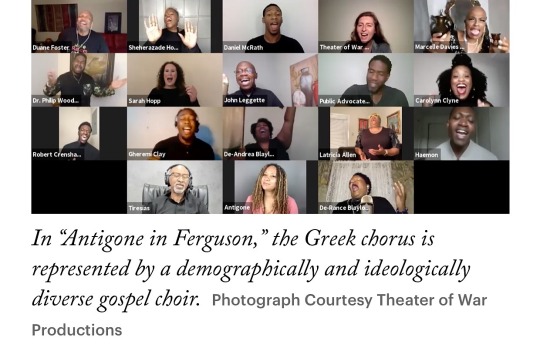
Excerpt:
If we borrow the terms of Greek drama, 2020 might be viewed as the year of anagnorisis: tragic recognition. On August 9th, the sixth anniversary of the shooting of Michael Brown, I watched the Theater of War Productions put on a Zoom production of “Antigone in Ferguson”: an adaptation of Sophocles’ “Oedipus” narrative sequel, with the chorus represented by a demographically and ideologically diverse gospel choir. Oscar Isaac was back, this time as Creon, Oedipus’ successor as king. He started out as a bullying inquisitor (“I will have your extremities removed one by one until you reveal the criminal’s name”), ordering Antigone (Tracie Thoms) to be buried alive, insulting everyone who criticized him, and accusing Tiresias of corruption. But then Tiresias, with the help of the chorus, persuaded Creon to reconsider. In a sustained gospel number, the Thebans, armed with picks and shovels, led by their king, rushed to free Antigone.
“Antigone” being a tragedy, they got there too late, resulting in multiple deaths, and in Isaac’s once again totally losing his shit. It was almost the same performance he gave in “Oedipus,” and yet, where Oedipus begins the play written into a corner, between walls that keep closing in, Creon seems to have just a little more room to maneuver. His misfortune—like that of Antigone and her brother—feels less irreversible. I first saw “Antigone in Ferguson” live, last year, and, in the discussion afterward, the subject of fate—inevitably—came up. I remember how Doerries gently led the audience to view “Antigone” as an illustration of how easily everything might happen differently, and how people’s minds can change. I remember the energy that spread through the room that night, in talk about prison reform and the urgency of collective change.
###
Again, the full article is accessible via the source link below:
#oscar isaac#theater of war#oedipus the king#antigone in ferguson#creon#frances mcdormand#john turturro#jeffrey wright#david strathairn#frankie faison#bryan doerries#sophocles#zoom#the oedipus project
117 notes
·
View notes
Text
Howl's Moving Castle & the Power Narrative Holds Over Reality
Like most 90s borns, my first anime was Pokémon. I watched the first three seasons diligently, and my tooth fairy gifts were always VHSs of memorable episodes. But like most Millennials and even Gen-X before us, my first real entryway to Japanese culture was Hayao Miyazaki. On the tiny TV screen, behind even for 2002, where my mother would watch her TV shows as she worked out, I watched Spirited Away. Chihiro/Sen's coming-of-age story and the movie's numerous themes deserves their own essay, and one I think better bloggers, vloggers and ordinary people have written before me. But after such a masterpiece, I jumped at the chance to see the next Studio Ghibli movie, Howl's Moving Castle. I rushed to the local library to read the book before it aired in the nearby city's bus station mall's small cinema. 18 years later, too nauseous for schoolwork and mooching off of my dad's Netflix account, I decided to rewatch this film. ***Spoiler alert for both book AND film*** The film itself is a staunch anti-war message, released around the same time as the invasion of Iraq, informed by Miyazaki's own childhood in the final years of Imperial Japan and the horrors inflicted on his home country to set the stage of the Cold War. The exposition includes a bombing of Sophie's hometown with...banners. The citizens of Ingary are terrified of the flying machines descending upon their skies, they expect bombs and destruction and untold death and unspeakable horrors. So when they instead get rained down paper pieces with pictures and words we are never privy to, they treat it with suspicion. They refuse to so much as touch them, since it's of the enemy. And the day after, when Ingary soldiers distribute their own country's propaganda banners, they drink it down without a second thought. Again, we are never privy to what they say. Perhaps it was meaningless. Perhaps, to the common contemporary viewer, the content would be incomprehensible. But for me, it got me thinking: What if this was the "enemy" spreading missing posters of their prince? What if this was a warning for the townspeople to evacuate, as they expect to take point there? And if it was, what the hell did it accomplish, outside of everything BUT what it tried to? The people are too scared. They see it as psychological warfare, whether intentional or not, and therefore the papers become a terrorizing presence, whether they were filled with graphic threats or pleas for cooperation, all it ended up doing is scaring the population into a deeper layer of hatred. I personally disagree with the film's apparent message, but I agree with how much of war is the matter of spinning the truth. No character represents a better allegory for spinning the truth than Sophie Hatter, the main character of the movie. The first thing we notice about her is how intricate and colorful all her creations are, while she sticks to a plain hat with minimal detail. We see her displeasure with her own appearance even when trying it on in front of the mirror. She dresses plainly for she thinks herself plain - wearing a mousy dress in both the source book and the film adaption. The book elaborates on this narrative and its subversion: In Ingary, fairytale tropes are accepted as divine truths. Sophie and her sister Lettie have had their mother die as toddlers, so when their father remarried and produced a third sister(briefly referenced in the film), Martha, Sophie and Lettie were doomed to be wicked, hideous stepsisters. But not only did their stepmother raised them as her own, but both all the Hatters were stated to be beautiful, with Lettie in particular having the entire town's male population vying for her affection in both book and film. In fact, the cunning one is the designated "Cinderella", Martha, who uses her guile to warn her half-sisters. See, another trope specific to Ingary was that the firstborn of three siblings will never find their luck - if they ever dare try, they will encounter disaster after misfortune and end up poor and miserable. According to Martha, her mother wanted to enjoy a life of luxury, so she sent Lettie to work in a bakery where she will surely find a man of her liking to start a life with, and shipped her own daughter off to be a magic apprentice far far away from her. Sophie is the only one she kept close, because she knew she buys into the tropes and will make her fortune for her, preferring the safety of her late father's shop to the dangers of the unlucky life of a firstborn. But in both film and book, this blissful avoidance of any exploration is torn away in a chance encounter Sophie has with the notorious wizard Howl. While her sister(s) are terrified for her safety, Sophie has no fear of the 'heart-eating monster' as "he only eats the hearts of beautiful girls", believing her plainness protected her. But oh, how she was wrong. Or was she? In both book and film, the Witch of the Wastes barges into the hat shop. In the book, she seeks Lettie whom Howl is taken with(like literally every man in town) and enters the shop where an overworked Sophie loses her temper at her, and mistaking the hatter for her sister, she curses the girl to become old. In the film, she's explicitly exacting revenge on Sophie, whom Howl is interested in, and follows her and invades her shop after closing time, cursing her to be ninety years old. This is supposed to devastate Sophie - rob her of her youth, beauty and health, ending her life before she started them. But in both versions, Sophie acclimates to the change rather well, constantly noticing the perks of living as an old lady - she can mumble to herself and be seen as normal, she can be assertive and commanding without being inappropriate and/or bossy, and since she has nothing to lose, she might as well go exploring the world, if only to lift the curse. To revisit this as someone who didn’t expect to have the option of growing old, this is an empowering message on its own - growing old is what you make of it. But despite subverting the Witch's narrative, Sophie remains a helpless victim of her own narrative. Book Sophie is explicitly said to be a powerful sorceress unaware of her own powers, even enchanting her hats into the client's shape with her words alone, while in the film it's only implied. But in both versions she Unconsciously Maintains Her Own Curse: She reverts to the eighteen year old in her sleep, or when something silences her insecurities enough. In the film, she's explicitly shown to de-age as she gains confidence in herself under the role of the household maid, going from the frail ninety-year-old into someone who looks and acts as a woman just past middle age - I don't think this is incidental, as many women are at their most confident at that age, when they no longer feel pressured to worry about trivial matters such as beauty and childrearing, and retreat back into the original cursed form when Howl calls her beautiful - a compliment she can never accept. In the book, Howl eventually comes to the conclusion that she likes being old and gives up trying to guide her out of it. The book takes narrative subversion even further. Remember cunning Martha? Turns out, the Hatters didn't conform to their mother's narrative either - Martha was bored by wizardry while Lettie craved it. The two concocted a plan to glamour as one another, which of course the mentor witch saw right though, and preferred Lettie's genuine interest to Martha ghosting the craft. This stings extra once Fanny is shown to be a caring mother who attacks who he thought cursed her stepdaughter - perhaps she fell for the same sort of thinking Sophie did, and wanted her stepdaughter to have the best life possible for someone doomed to fail, thought extroverted Lettie enjoyed the attention and choice of men and wanted Martha to be a powerful, self-sufficient young woman who led a life more glamorous than she did, as someone who lacked magic? That Fanny was a real parent - a well-intentioned woman who completely misjudged her children and their future? Is it possible Martha’s own narrative has poisoned her relationship with her mother, perhaps beyond repair? As for Sophie, in the book she breaks her own curse by breaking the contract between Calcifer and Howl. But the film gives it more nuance - Calcifer and Howl are clearly in a codependent relationship: In both versions Howl gave Calcifer his heart in exchange for magical powers (as well as saving the fallen star's life, depending on your interpretation of the character), but by the time Sophie employs herself at the Castle, Calcifer feels more like a slave than a powerful demon. Howl himself has his own internal struggles, and many online have made convincing cases for BPD being among them. Calcifer is an essential part of his support system. Each one of them believes that if Calcifer isn't fed properly, or gets dunked with water, they'll both die. And once Sophie does so to stop the wizened, depowered Witch of the Wastes from literally being consumed by her obsessive desire for Howl, she too believes to have killed them both with her rash actions. But they live, because Sophie's part in a time loop led her to think otherwise and refuse to give up on them. Within the film’s universe, this ties into Sophie’s innate magical powers talking reality into her perception. But I know real-life, ordinary people who’s own narratives have changed grim fates. Now, I don’t live in Ingary. I don’t believe the world around me has literal, reality-warping magic. I’m not a spiritual person. But this is precisely why Howl’s Moving Castle appealed to me - because the characters’ thoughts don’t perfectly dictate reality, but the way they act on their perceptions does. I know a man who is alive because his (now ex-)wife changed the narrative of his deathbed to one of optimism and efficacy. When I stopped trying to have my self-image reflected in the eyes of others, I transformed into a more confident, capable person practically overnight. I’m not delusional - I’m well aware of the Dunning-Krueger effect, of how reality exists whether you live in it or not. I’d like to think I live strictly within the boundaries of what is proven beyond reasonable doubt to be real.
But your spin on reality dictates your life. It can dictate parts of the lives of your close ones. But the message isn’t one of just changing your own view of a situation around you to become happy, oh no. Lettie and Martha didn’t just choose to be happy in apprenticeships they had no passion for. Sophie didn’t just relocate to some quaint cottage to live the few years that weren’t stolen from her as an old hermit. They acted to transform the existent reality within their means, but they could only do so because they felt empowered enough to question their life’s narratives.
15 notes
·
View notes
Text
Cork in Verse | Ana Spehar interviews Jim Crickard
Cork in Verse is a series of interviews by Ana Spehar with Cork Poets. This week Ana interviews Jim Crickard.

Jim Crickard’s poetry is camp, entertaining work that explores culture, sexuality and identity with a hint of colour. In 2020 he was invited to represent Cork in the Cork-Coventry Twin City Exchange, which was moved online due to pandemic. In 2019 he was selected by Poetry Ireland for the inaugural Versify series and performed to a sold out show at Dublin Fringe Festival. He came second in the 2019 All Ireland Poetry Slam Final (and is working through his feelings about it with a therapist). In 2018, he won the Cuirt Spoken Word Platform and was awarded a slot to perform at Electric Picnic. In 2020 his poetry was broadcasted on RTE Arena. A poem he wrote was shortlisted in the 2018 O'Bheal International Five Words Competition, and his work has been published in Automatic Pilot, A New Ulster, and Contemporary Poetry.
When did you start writing?
I started writing when was 16. I had just come out of the closet, my older brother Shane (20) died the same year in a road traffic accident. Looking back, I think I needed space for expression. I started out with a journal before sleep. It was playful, private, and helped organise my thoughts. I’d draw a little picture at the end of each entry. I acted a bit like Virginia Woolf, with a high-neck collar, writing solemnly by candle light. When people write diaries, I think they secretly fantasise them being found and read by the masses.
When I was introduced to poetry in my Leaving Cert, I found it to be a bit stiff and flowery with poets like Keats, which had some appeal, but when we moved on to Adrienne Rich and Eavan Boland I was a lot more inspired. It was seeing people use the art form to represent women and give voice to minorities, and how they both textured their work with the confessional. I started writing my own poetry at the end of my journal entries but kept it secret. After a few years, and my first break-up, I started sharing online on a site called AllPoetry. It was great because there were little competitions between users and when I won a few of them I felt brave enough to share my work on Facebook. A few people were kind, but most were indifferent.
When I started going to O’Bheal in Cork, though, I really felt like writing could have a future for me. Writing and performing alongside other writers really makes it a lot more gratifying and instils the self-belief you need to keep going.
Could you tell us more about your creative process?
I’m always on the lookout for something to play with and tease out until it’s a poem. I write with the intention of making people laugh when they hear me perform. Unfortunately, ideas rarely happen when I’m walking around day-dreaming. I mostly need to sit down and write to find the idea or follow whatever I’ve got on my mind. One of my favourite poems that I’ve written takes a hen party in a gay bar and expands it into a series of images and scenarios that delight me and make me laugh. If it makes me laugh, then I trust that it’ll make a crowd of people laugh. I didn’t start out with that idea of the hen party though, I was trying to write a rather embarrassing romantic poem set in a gay bar, it was for a guy I was briefly dating. Suddenly there was a hen party in the corner. They abducted me with their willy-straws and novelty-glasses, and I followed their embarrassing moments and social faux-pas as they ran around, interloping and ruining the sacred queer-space. I was much more interested in them than the romantic poem I set out to write. I suppose it’s important to trust where the poem is going and let it reveal itself. If I ignored them and focused on the poem I was trying to write then I’d have missed out.
How does the creative process of writing affect your mood?
I’m elated when it comes together. I love when I get into a flow and my fingers are typing as fast as they can and what I’m writing is surprising me. That doesn’t always happen though, it can be slow and boring and the cursor can be blinking in front of me waiting for me to write something.
How often do you write? Do you write every day?
I wish I wrote every day. I’ve heard multiple sources say that that’s the best way to approach it, and I would definitely believe it. I have had periods where I wrote a new poem every week, possibly more than one. I have also had long periods of not expressing anything on the page. The latter feels depressing and I feel my life passing me by. It is this dread I feel that I’m losing precious time to grow and improve as a writer. I rationalise it by reminding myself that I need to work full-time, clean my apartment, cook dinner, which is all true. I also excuse myself by saying that I need to relax and watch some TV or listen to a podcast. I think that writing is the purest of me-time and I’d like to transform my relationship with it.
Can you tell us more about Venus Envy?
I have been known to dress in drag from time to time... I performed as Venus for Pride in O’Bheal. Afterwards I went to The Crane Lane with all of the poets. It was interesting being a drag queen out of context in another bar... People wanted to talk to me, some random stranger touched me as they passed by, and someone confided in me with something they had not mentioned before. There’s a strange power to being in drag. It’s like being a shaman, a eunuch, a jester, who is on the outside looking in. You can say things that you daren’t dream of otherwise, and people love you for it. If I had the time and money to do it more often I would. Drag will always have a special place in my heart, and on my right arm is a tattoo-portrait of Panti Bliss, the Queen of Ireland. I’ve thought about putting more drag queens beside her, but it would be like Mount Rushmore of Drag on my arm. Who knows, maybe I will.
‘Hen Party in The George’
Be careful around the corners, don’t make eye-contact at the bar,
watch out for the mom, she’s on safari, in search of exotic birds.
For a parrot to echo her punchlines,
or maybe a cockatoo,
she’s prowling around the cocktail lounge,
she’s looking for me and you.
The mother of the bride uses her lazy-eye
to her advantage,
she edges into a group of faces with meandering conversation.
Now blocking their exit, unsure
who she’s addressing,
on about her gay hairdresser, how great
he is with the scissors.
“I’ve never had a problem with the gays now myself” she says,
pausing to sip from a pink plastic penis,
pausing for praise.
And one by one, the gays fly south,
migrating to the bar,
to the dance floor, to South-Africa if necessary.
“Snobs” she calls em -
“them gays can be awful touchy.”
All her Christmases at once
when the black crow drag queen
stalking her long legs across the stage,
seven foot tall, in a silver crown of feathers refracting light off the disco-ball.
“Jesus” she says, stealing the
microphone: “you’re looking better than me”
“I should feckin hope so” the drag queen says “you’re twice me bleedin’ age!”
Slowly, slowly, the hen party has pissed off all of the George...
Abandoning punctured plastic husbands all over the stage.
Flashing so many cameras it feels like E.T.’s family has landed.
A gathering parliament of lesbians encircles the hens,
a murder of goth gays come down from their perch
I wonder if they’ve seen Hitchcock’s movie, ‘The Birds…’
by Jim Crickard
Sex in the Housing Crisis
We are the generation of born-again virgins
headboards disturb housemates on shift work,
Air-traffic controllers should be included in rent
to coordinate times to get the ride
Landlords can afford to support our sex-lives
and change carpets once in a while
We are the generation of born-again virgins
Like ships in the night, we work to survive,
but we are no thirty year old cargo boats…
anchored in the harbour, waiting for labour,
we are Ferrari red speed boats
with miles to go before we sleep,
miles to go before we sleep.
We are the generation of born again virgins
Nothing kills the mood like mildew
home-sense is built on the backs of millennials
fumigating probate houses
converted into one-beds
with constellations of mould
and half their salary paid
to make out on an old couch
facing a microwave
We are the generation of born again virgins
If you’re living with parents you can forget it
unless you can face breaking their trust
and explain condoms in the toilet-drain.
We must not forget about our parents sex-lives
afraid their carefully considered bed springs
will be heard by their thirty somethings
Let’s give the government hell for
this inter-generational dry spell!
by Jim Crickard
3 notes
·
View notes
Text
Hello class my name is Luisiana Delgado, a fact about me it’s that I’ve never been in art class in my whole life but I’m free to learn new things and receive critiques.
I was assigned #23 which is Damien Hirst 1992 The Physical Impossibility of Death in the Mind of Someone Living.
•Damien Hirst won Tate Britain’s Turner Prize for contemporary art in 1995.
•Hirst wanted to create an installation that made people feel that they were in a pharmacy.
•Hirst is an English artist and art collector.
•He is reportedly the United Kingdom's richest living artist.
•Hirst is recognized for combining a maverick sensibility with an unerring aesthetic instinct.
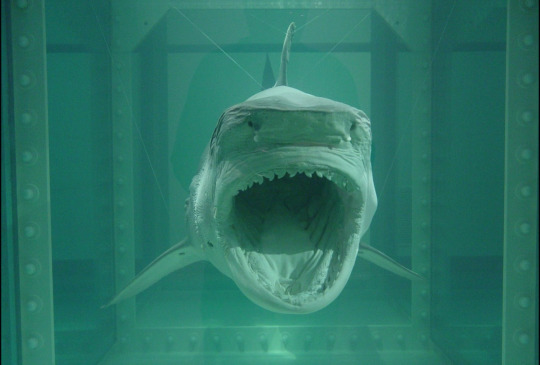
After looking at the art for a few minutes and doing my research about the artist and on how the art was impacting people, and I can agree that the way I thought about art did change when I looked at it. I first thought that it was a simple “shark” picture but after informing myself about the author and the theme I could see and understand that a glass tank means more than it for the shark I researched that it represents a powerful image of an animal. I can also see a difference in art now after reading about the artist and the image of the shark. We can’t just judge an art/image just by seeing it, we have to inform ourselves and analyze it, I can definitely try to understand more deeper into the artist and the art they create.
1 note
·
View note
Photo

The Story Behind Every Song On Will Butler’s New Album Generations
Will Butler has a lot on his mind. It has, after all, been five years since his solo debut, Policy. A lot can happen in half a decade, and a lot has happened in this past half-decade — much of it quite dire. Butler was in his early 30s when Policy came out, and now he’s closing in on 40. He’s a husband and father. And he’s shaken by the state of the world, the idea of being an artist and a soon-to-be middle-aged man striving to guide his family through the chaos.
At least, that’s how it comes across through much of Generations, his sophomore outing that arrives today. Generations is a big, sprawling title by nature, and the album in turn grapples with all kinds of big picture anxieties. Mass shootings, the overarching darkness and anxiety of our time, trying to reckon with our surroundings but the system overload that occurs all too easily in the wake of it. Then there are more intimate songs, too, tales drawn from personal lives as people plug along just trying to navigate a tumultuous era.
Butler is, of course, no stranger to crafting music that seeks to parse the cultural moment and how it impacts in our daily lives. Ever since Arcade Fire ascended to true arena-rock status on The Suburbs 10 years ago, they have embarked on projects that explicitly try to make sense of our surroundings. (Not that their earlier work was bereft of heavy concepts — far from it — but Reflektor and Everything Now turned more of a specific eye towards contemporary ills and trials.) But as one voice amongst many in Arcade Fire, there is a cinematic scope to whatever Butler’s playing into there.
On Generations, he engages with a lot of similar concerns but all in his own voice — often yelping, desperate, frustrated then just trying to catch a breath. Butler leans on his trusty Korg MS-20 throughout Generations, often giving the album a synth-y indie backdrop that allows him to try on a few different selves. There are a handful of surging choruses, “la-la” refrains batting back against the darkness, slinking grooves maybe allowing someone the idea of brief physical release amidst ongoing strife.
Ahead of Generations’ arrival, Butler sent us some thoughts on the album, running from inspiration between the individual tracks to little details about the arrangement and composition of different songs. Now that you can hear the album for yourself, check it out and read along with Butler’s comments below.
1. “Outta Here”
I think this is the simplest song on the record. Just, like, get me out of here. Get me fucking out of here. I’m so tired of being here. No, I don’t have another answer, and I don’t expect anything to be better anywhere else. But, please, I would like to leave here.
I can play plenty of instruments, and can make interesting sounds on them, but kinda the only instrument I’m good at is a synth called the Korg MS-20. That’s the first sound on the record. It makes most of the bass you hear on the record. It’s a very aggressive, loud, versatile machine, and I wanted to start the record with it cause I’m good at playing it and it makes me happy.
2. “Bethlehem”
This song partly springs from “The Second Coming” by William Butler Yeats: “What rough beast, its hour come round at last, slouches towards Bethlehem to be born?” Like a lot of folks, I woke up after the election in 2016 mad and sad and scared and exhausted. This song is born of that emotion.
My bandmates Jenny Shore, Julie Shore, and Sara Dobbs sing the bridge, and it’s a corrective to my (appropriate?) freaking out — this isn’t the apocalypse. You’re misquoting Yeats. Get your fucking head on straight. History has not ruptured — this shit we’re in is contiguous with the shit we’ve been dealing with for a long, long time. But still, we sometimes do need an apocalyptic vision to make change. Even if it’s technically wrong. I dunno. It’s an ongoing conversation.
There’s a lot of interplay with backing vocals on this record — sometimes the narrator is the asshole, sometimes the backing vocals are the asshole. Sometimes they’re just trying their best to figure out the world. This song starts that conversation.
3. “Close My Eyes”
I tried to make these lyrics a straightforward and honest description of an emotion I feel often: “I’m tired of waiting for a better day. But I’m scared and I’m lazy and nothing’s gonna change.” Kind of a sad song. Trying to tap into some Smokey Robinson/Motown feeling — “I’ve got to dance to keep from crying.”
There’s a lot of Mellotron on this record, and a lot of MS-20. This song has a bunch of Mellotron strings/choirs processed through the MS-20. It’s a trick I started doing on the Arcade Fire song “Sprawl II,” and I love how it sounds and I try to do it on every song if I can.
4. “I Don’t Know What I Don’t Know”
This makes a pair with “Close My Eyes” — shit is obviously fucked, but “I don’t know what I don’t know what I don’t know what I can do.” I’m not a proponent of the attitude! Just trying to describe it, as I often feel it. In my head, I know some things that I can do — my wife Jenny, for instance, works really hard to get state legislatures out of Republican control. Cause it’s all these weirdo state legislative chambers that have enormous power over law enforcement, and civil rights, and Medicaid, and everything.
The image in the last verse was drawn from the protests in Ferguson in 2015: “Watch the bullets and the beaters as they move through the streets — grab your sister’s kids — hide next to the fire station…” It’s been horrifically disheartening to see the police riot across America as their power has been challenged. I’ve got a little seed of hope that we might change things, but, man, dark times.
More MS-20 bass on this one, chained to the drum machine. This one is supposed to be insanely bass heavy — if it comes on in a car, the windows should be rattling, and you should be asking, “What the heck is going on here?” Trying for a contemporary hip-hop bass sound but in a way less spare context. First song with woodwinds — rhythmic stuff and freaky squeals by Stuart Bogie and Matt Bauder.
5. “Surrender”
This song is masquerading as a love song, but it’s more about friendship. About the confusion that comes as people change: Didn’t you use to have a different ideal? Didn’t we have the same ideal at some point? Which of us changed? How did the world change? Relationships that we sometimes wish we could let go of, but that are stuck within us forever.
It’s also about trying to break from the first-person view of the world. “What can I do? What difference can I make?” It’s not about some singular effort — you have to give yourself over to another power. Give over to people who have gone before who’ve already built something — you don’t have to build something new! The world doesn’t always need a new idea, it doesn’t always need a new personality. What can you do with whatever power and money you’ve got? Surrender it over to something that’s already made. And then the song ends with an apology: I’m sorry I’ve been talking all night. Just talk talk talking, all night. Shut up, Will.
Going for “wall of sound” on this one — bass guitar and bass synth and double tracked piano bass plus another piano plus Mellotron piano. The “orchestra” is about a dozen different synth and Mellotron tracks individually detuned. And then run through additional processing.
6. “Hide It Away”
This song is about secrets. Both on an intimate, heartbreaking level — friends’ miscarriages, friends’ immigration status, shitty affairs coming to light — and on a grand, horrible level: New York lifting the statute of limitations on child abuse prosecutions, all the #MeToo reporting. There’s nothing you can do when your secret is revealed. Like, what can you do? You just have to let the response wash over you. If you’ve done something horrible, god-willing, you’ll have to pay for it in some way. If it’s something not horrible, but people will hate you anyway, goddammit, I wish there were some way to protect you.
This song has the least poetic line on the record, a real clunker: “It’s just money and power, money and power might set them free.” But it’s a clunky, shitty concept — the most surefire protection is being rich and knowing powerful people. But even then, shit just might come out. Even after you’re long dead.
Came from a 30-second guitar sample I recorded while messing around at the end of trying to track a different song. I liked the chords, looped them to make a demo. And the song was born from there. This is the one song I play drums on. Snare is chained to the MS-20, trying to play every frequency the ear can hear at the same time on some of those big hits.
7. “Hard Times”
[Laughs] I sat down and tried to write a Spotify charting electro-hit, and this is what came out: “Kill the rich, salt the earth.” Oh well. Written way before COVID-19, but my 8-year-old son turned to me this spring and asked, “Did you write the song ‘Hard Times’ about now, because we’re living through hard times?” No, I didn’t.
In Dostoevsky’s Notes From Underground, the narrator is a real son-of-a-bitch—contrarian, useless. Mad at the strong confident people who think they’ve got it figured out. And they don’t! And neither does the narrator — but he knows he doesn’t, and he at times yearns for some higher answer, and he’s funny, and too clever, but still knows he’s a piece of shit. I read Notes From Underground in high school and kinda forgot how it shaped my worldview until I sat down with it a couple years ago. The bridge on this song is basically smushed up quotes from Notes From Underground.
I was asking Shiftee, who mixed the record, if there are any vocal plug-ins I should be playing around with. He pointed me toward Little AlterBoy, which is basically a digital recreation of the kind of pedal the Knife use, for instance, on their vocal sound. It can shift the timbre/character of a voice without changing the pitch. Or change pitch without changing character. Very fun! Very much all over this track. Tried to make the bridge sound like a Sylvester song.
8. “Promised”
Another friend song masquerading as a love song. I’ve met a handful of extraordinary people in my life, who stopped doing extraordinary work because life is hard and it sucks. People who — I mean, it’s a lottery and random and who cares — could be great writers or artists, who kind of just disappeared. And it’s heartbreaking and frustrating. I don’t blame them. Maybe they weren’t made for this world. Maybe it’s just random. Maybe they’ll do amazing work in their 60s!
We tracked this song before it was written. Julie and Miles came over and we made up a structure and did a bunch of takes, found a groove. Which I then hacked up into what it is now! The bed tracks are lovely and loose. Maybe I’ll put out a jammier version of this song at some point. The other big synth on this record is the Oberheim OB-8, and that’s the bass on this one (triple tracked along with some MS-20).
9. “Not Gonna Die”
This song is about terrorism, and the response to terrorism. I wrote it a couple weeks after the Bataclan shooting in Paris in 2015. For some reason, a couple weeks after the shooting, I was in midtown Manhattan. I must have been Christmas shopping. I had to pop into the Sephora on 5th Avenue to pick up something specific — I think for my wife or her sister. I don’t remember. But I remember walking in, and the store was really crowded, and for just a split second I got really scared about what would happen if someone brought out a gun and started shooting up the crowd. And then I got so fucking mad at the people that made me feel that emotion. Like, I’m not gonna fucking die in the midtown Sephora, you fucking pieces of shit. Thanks for putting that thought in my head.
BUT ALSO, fuck all the fucking pieces of shit who are like, “We can’t accept refugees — what if they’re terrorists?” FUCK OFF. Some fucking terrified family driven from their home by a war isn’t going to kill me. Or anyone. Fuck off. Some woman from Central America fleeing from her husband who threatened to kill her isn’t going to fucking bomb Times Square. You fucking pieces of shit.
In November/December 2015, the Republican primary had already started — Trump had announced in June. And every single one of those pieces of shit running for president were talking about securing our borders, and keeping poor people out, and trying to justify it by security talk. FUCK OFF. You pieces of shit. Fuck right off. Anyway. Sorry for cursing.
I kind of think of the outro of this song as an angry “Everyday People.” Everyday people aren’t going to kill me. Lots of great saxes on this track from Matt Bauder and Stuart Bogie.
The intro of the song we recorded loud, full band, which I then ran through the MS-20 and filtered down till it was just a bass heart-pulse, and re-recorded solo piano and voice over that.
10. “Fine”
I kind of think that “Outta Here” to “Not Gonna Die” comprise the record, and “Fine” operates as the afterword and the prologue rolled into one. An author’s note, maybe. It was kind of inspired by high-period Kanye: I wanted to talk about something important in a profane, sometimes horribly stupid way, but have it be honest and ultimately transcendent.
In the song, I talk semi-accurately about where I come from. My mom’s dad was a guitar player who led bands throughout the ’30s and ’40s. In post-war LA, he had a band with Charles Mingus as the bass player. Charles Mingus! One of the greatest geniuses in all of American history. But this was the ’40s, and in order to travel with the band, to go in the same entrances, to eat dinner at the same table, he had to wear a Hawaiian shirt and everybody had to pretend he was Hawaiian. Because nobody was sure how racist they were supposed to be against Hawaiians.
Part of the reason I’m a musician is that my great-grandfather was a musician, and his kids were musicians, and their kids were musicians, and their kids are musicians. Part of the reason is vast generations of people working to make their kids’ lives better, down to my life. Part of the reason is that neither government nor mob has decided to destroy my family’s lives, wealth, and property for the last couple hundred years. I tried to write a song about that?
Generations is out now via Merge. Purchase it here.
https://www.stereogum.com/2098946/will-butler-generations-song-meanings/franchises/interview/footnotes-interview/
30 notes
·
View notes
Text
The Last Word: Shirley Manson on Fighting the Patriarchy and How Patti Smith Inspires Her
The Garbage singer also talks racial justice, living for now, and why legacy is an inherently masculine concern
Almost as soon as Garbage’s self-titled debut blew up overnight in 1995, their singer, Shirley Manson, became aware of the patriarchy running the music industry. Even though she was the group’s focal point — belting dusky electro-rock songs about making sense of depression (“Only Happy When It Rains”) and taking pride in nonconformity (“Queer”) — she was still a woman fronting a band of men, one of whom, Butch Vig, had produced Nirvana’s Nevermind. Almost immediately, she felt as though her role in the group was being devalued — not by the guys she worked with, but externally.
“There was a lot of stuff written about me in the music press, and that’s when I started to realize how I’m being diminished, how, in some cases, I’m being completely eradicated from the narrative because I’m female and not a man,” she says now. “I was talked over by lawyers; I was ignored by managers. The list goes on. It’s boring and tedious; there’s no point in me moaning about it now, but certainly, that was my awakening.”
That revelation emboldened her to speak out about equality and she quickly became a feminist icon, using her platform to bring attention to human rights, mental health, and the AIDS crisis. All the while, she wrote inclusive hit songs with Garbage about androgyny and reproductive rights (“Sex Is Not the Enemy”). On Garbage’s great new album, No Gods No Masters, she grapples with racial injustice, climate change, the patriarchy, and her own self-worth. But as weighty as the subject matter is, she approaches each song in her own uniquely uplifting way.
“I don’t think really the record is serious, per se,” the singer, 54, says, on an early May phone call. “I think it’s an indignant record. I think in indignance you can still carry humor with you, as well as softness, kindness, and love in your heart. I just felt it would be inauthentic to say anything other than what I was saying in my daily life across the dinner table from my friends and my family. I think as you get older as an artist, the challenge is, ‘How I can be my most authentic self?’ because that’s the most unique story I can tell. In an industry that’s just absolutely jam-packed to the rafters with ideas, opinions, melodies, and so on, you can’t afford to be anything other than your most authentic self. It won’t last.”
Authenticity and being true to herself are the qualities that have made Manson who she is. And those traits seem to guide her answers to Rolling Stone’s questions about philosophy, life lessons, and creature comforts for our Last Word interview.
What are the most important rules that you live by? I’m 54, which is ancient for the contemporary music industry. At this point, I feel like if it’s not fun, then I’m uninterested entirely. If somebody’s treating me poorly, I have to walk away. Life is so fricking short, and I’m three quarters of the way through mine already; I just want to have a good life, full of joy.
Who are your heroes and why? Patti Smith is a huge hero for me for a lot of different reasons. Most importantly, it’s because she’s a woman who has navigated her creative life so beautifully and so artfully, with such integrity and authenticity, and she has proven to me that a woman, an artist, does not have to subscribe to the rules of the contemporary music industry.
It’s very rare for other women to see examples of women actually working still in their seventies. That, to me, is really thrilling and really inspiring, and it fills me with hope. At times when you come up against the ageism, sexism, and misogyny that exists in our culture, I always try and picture Patti in my mind’s eye, and it always brings me back to center, like, “OK, adhere to your own rules. Design your own life. Be your own architect. You can continue to be an artist the rest of your life.” And to me, that’s life. That is a fully lived life.
You’re also a role model yourself. How do you handle that responsibility? I’m a bit speechless if the truth be told. I realize that I’ve now enjoyed a long career in music, and by default, I think people are inspired by that. I think whenever you see an artist, no matter who they are, when someone can endure, I think that’s exciting to everybody else, because it’s a message that says, “You too can get up when you think you’re done. You too can brush yourself off and try again.” By just continuing, you can help other people continue and fulfill themselves in ways that they thought they wouldn’t be able to.
I try to be a decent person. I make mistakes. I fuck people off. I say stupid shit. I’m not all-knowing; I am ignorant in so many ways. But I do try my best. I think that’s really all I can ask of myself.
How others perceive me is absolutely out of my control. There’s always going to be people who think I’m an arsehole, and that’s just part and parcel of being in the public eye. People are just going to hate on you, so I try not to take too much of it in; I don’t let it absorb me too much. I have gotten to that point in my life when I’m able to just go, “You know what? Fuck it. You can’t win them all.”
You once said that the idea of legacy was a masculine construct that you don’t believe in. Do you still feel that way? Yeah. I still very much believe in that. I know a lot of male artists who bang on about their legacy and their importance. Not to knock that if that’s what’s important to you but for me personally, what do I care? I’m going to be dead and gone and totally unconscious of any so-called legacy that I might leave behind. I want fun now. I want to have a good life now. I want to eat good food now and have great sex. It’s absolutely meaningless to me what happens after I’m gone. I want to use my time wisely, and that’s all that I really am concerned with, to be honest.
What is it about legacy that’s inherently masculine? This is armchair psychology, so please forgive me, but I’m sure it has something to do with how women have this uterus that can bear children. I think that’s profound. One of the few gifts that men have not been given is that ability to create with your body, and your blood, and your heat and all these nutrients from your body. Perhaps that’s one of the reasons why you don’t hear as many women banging on about the great legacy they’re going to leave behind. I think for women it’s their kids.
You’re Scottish. What is the most Scottish thing about you these days? I’ve got a lot of grit, and it’s served me really well in my career. I think that is a really Scottish trait. The Scottish people are tough, and they also have a good sense of humor. So, grit with humor. I should say “gritted with humor,” in the same way we grit roads.
As you were saying “grit,” it occurred to me that a lot of your songs are about survival and moving forward, going back to “Stupid Girl” or “Only Happy When It Rains.” They’re about perseverance. [Pauses] I think it’s funny you should say that because I’m just sort of like, “Wow, he might be right.” I do think that a huge theme for me is, “How do you overcome? How do we all overcome?” Things can be great for a while; things will not be great forever. And to every single life, these challenges appear. We all have to reconfigure ourselves in order to try to hurl ourselves over obstacles in order to have the kind of life we hope for. So I do think you’ve shocked me a little by discovering a theme for me. Yay, I feel thrilled. I have a theme. It’s exciting.
“Waiting for God” is one of my favorite songs on the album because of the way you address racial justice. How can we, as a society, fight white indifference? You know, that’s a question right there. It’s interesting that you use the words “white indifference,” because one of the things that shocked me so greatly is the ambivalence and the apathy of white people all over the world who are seeing what we’re seeing on our TVs and on the internet, and yet not having the moral courage to speak up. I think the most important thing we can do is pull back the carpet to see the mess on the floor in order for us to actually start cleaning it up.
If we could curtail some of the brutality of police against black people, that would be a good start. I think it’s going to be decades and decades and decades before we can start to really equalize our societies so that everyone is enjoying the spoils of Western wealth over in the developing world. It’s necessary that we try and help these countries that aren’t as powerful or as wealthy. It’s good for the whole world if we start to improve situations for everyone. Nobody will lose anything, and everyone has everything to gain.
But if I had the answers to how we go about fixing it, I would be in politics and not in music. I just know what I believe to be right, and I’m doing my best to use my voice to try and encourage my friends, my little ecosystem, to start with paying attention and supporting black businesses and elevating black voices and black talent.
What’s your favorite book? I have so many. The one that springs to mind would be American Pastoral by Philip Roth. I loved All the Pretty Horses by Cormac McCarthy. I loved The Collected Works of Billy the Kid by Michael Ondaatje. I loved Winnie the Pooh and Wuthering Heights. I’ve got so many that have really stuck with me that are classics.
My most favorite recent book that I’ve just finished reading is Dancer by Colum McCann about [Russian ballet dancer Rudolf] Nureyev. I was just absolutely mesmerized by it. It was just such a fantastic read, and he’s such a miraculous writer. He brought out Apeirogon last year about the struggle in between Palestine and Israel. He talks about this complicated mess with such clarity, kindness, and generosity. I couldn’t believe Apeirogon didn’t get more fuss made of it last year. Somehow it just seemed to get buried in the morass of other books, and of course the suffering that Covid had brought upon the earth.
What advice do you wish you could give your younger self? “Take up your space.” When I was growing up, to be a girl was to be told to minimize the space you took up: “Close your legs. Don’t be loud. Smile. Be cute. Be attractive. Be pleasing.” I inherently balked against that as a kid. I was a rebellious kid, and I wasn’t going to sit in the corner and be quiet. I’ve never been like that. However, looking back, I still notice some of the patterns of my own compliance. It’s not that I hate myself for it, but I just wish I could turn around and say to my young self, “Take your seat. If there’s not a seat there, drag a seat up to the table and sit down.”
I’m still really aware of the sexism and misogyny that I have had to battle throughout my career. I’m not crying, “Woe is me,” because I’ve obviously flourished in my career, and it obviously didn’t hold me back enough to hamper me in any way. But I feel for all the women who were unlike me, who didn’t have my forcefulness of personality, or my education, or my ability to articulate myself. I want that for all people, though; I want all people to stop trying to please, and accept that some people will like that, and some people won’t, and that’s OK. It’s OK that some people just don’t dig you.
On the topic of gender, I got a kick out of your song “Godhead,” where you ask if people would treat you differently “if I had a dick.” I’m really proud of that song, because I think it’s talking about something really serious, and it’s really fun. It’s about addressing the patriarchy, and how omnipresent it is. When I was young, I was so busy trying to make it, I didn’t see that there was a patriarchy in place. And it’s only as an adult, I start looking back going, “Oh, wow — when that A&R man told me to my face that he wanked over pictures of me, that was really uncool.” But at the time, you kind of laugh it off and just press on.
I was oblivious to it. In this song, I’m talking about how patriarchy bleeds into absolutely everything, specifically under organized religion. The “Godhead” is the male, and we are all under the godhead forever, and that’s unquestioned, and how crazy is that? Because a dude holds a higher position in society, because he’s got a dick and a pair of balls. Often, these balls are smaller than my own [laughs].
It just gets silly after a while, when you watch other men protect other men just for the sake of protecting the patriarchy. So few men are willing to speak up about bro culture and call into question the behavior of the men they are associated with. There’s just a reluctance by men to address this absolutely shocking, terrifying, depressing, pathetic assault by men of other people’s bodies.
In 1996, your bandmate Butch Vig said about you, “So many singers screamed to convey intensity, and she does the opposite. It just blew us away.” How did you come up with that approach? I don’t know. I’ve found that when people speak to me quietly, I feel the most threatened because I’m really comfortable with conflict. I thrive on conflict. It excites me in a funny way. When people are shouting, I don’t feel scared. I like to shout back; that’s just how my family were. We’d just start to shout at each other all the time. I’m not scared of elevated temper. For me, when people get really quiet, that’s when I know they’re really serious, because they’re in control of their rage, and that’s when they’re most deadly.
The last question I have is a shallow one. I love being cheap and superficial.
What’s the most indulgent purchase you’ve ever made? At the height of my success, I hired a person who would shop for me and then send everything in a big box to my hotel room. I would choose what I wanted and return anything else. One day, this beautiful pair of Italian leather boots arrived. I wore a pair very similar in the “Stupid Girl” video, and I thought, “Oh, yeah, these are really me. I’m going to keep these. These are amazing.” It was only when I got back from tour, I found out they cost $5,000. I can’t even laugh about it. It makes me so crazy. I still have these boots. I’d like to get rid of them just so that I never have to look at them again, but there they are every day, warning me of my own greed.
2 notes
·
View notes